Are you looking to improve your content marketing strategy?
Learn about the power of Informational Keywords and how they can drive traffic to your website that can become leads or sales for your business.
By understanding the definition, examples, and best practices for effectively incorporating informational keywords, you can improve your SEO and increase visibility for your business or brand.
Keep reading to discover how to utilize informational keywords to boost your online presence.
What Are Informational Keywords?
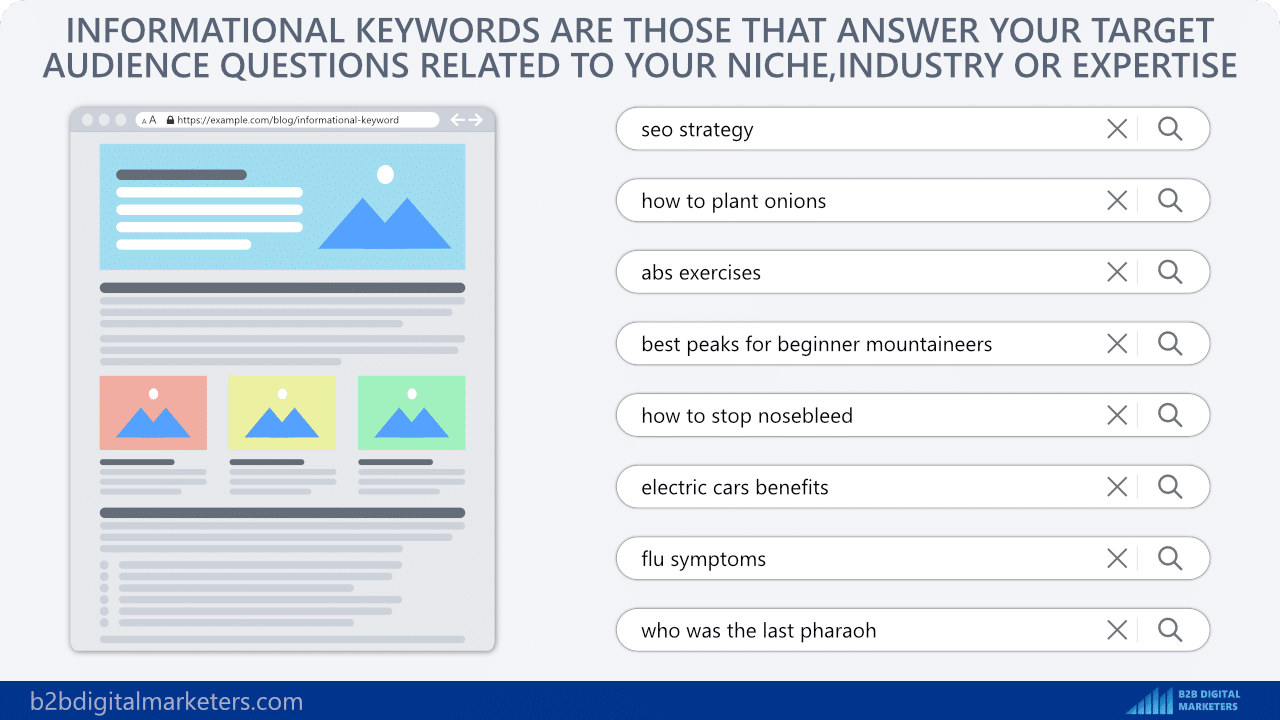
Informational keywords are a type of keyword used by users to gather knowledge, information, or understanding about a specific topic or subject. These keywords are typically used when users are seeking answers to specific questions or looking for general information.
They can be used to find information on a wide range of topics, including knowledge-based queries, such as understanding what something is, learning how to do something, discovering the importance of something, finding out when something occurs, as well as product or service-related information.
The main objective of utilizing informational keywords is to provide users with information and knowledge on a specific topic or to assist them in finding solutions to particular problems.
Informational keywords are mainly used during the early stages of the customer journey, such as the research and discovery phase, and even when the user is not yet actively seeking to make a purchase.
These keywords help to guide users to the information they need and can be used to improve the user experience by providing more specific information about the content of a webpage.
These keywords help customers find the information they are looking for and can include topics such as product features, industry news, or solutions to common problems.
Lastly, using informational keywords improves your brand credibility and builds trust with your target audience as you are providing helpful content which helps to establish your brand as the expert in the industry.
Why are Informational Keywords Important?
Informational keywords are vital in keyword research and SEO as they make up a significant portion of keywords in your industry.
They play a crucial role in helping to identify the topics and themes that are relevant to your audience and business, which in turn can help to improve your website’s visibility, boost your trust from users and search engines and increase search engine rankings.
By including informational keywords on your website, you can increase the chances of your website ranking higher in search engine results and being more easily discoverable by your B2C or B2B target audience.
With that, here are the four most important reasons why informational keywords are important:
Reason #1: Increase Search Visibility
In general, there are more informational keywords than commercial and transactional ones combined.
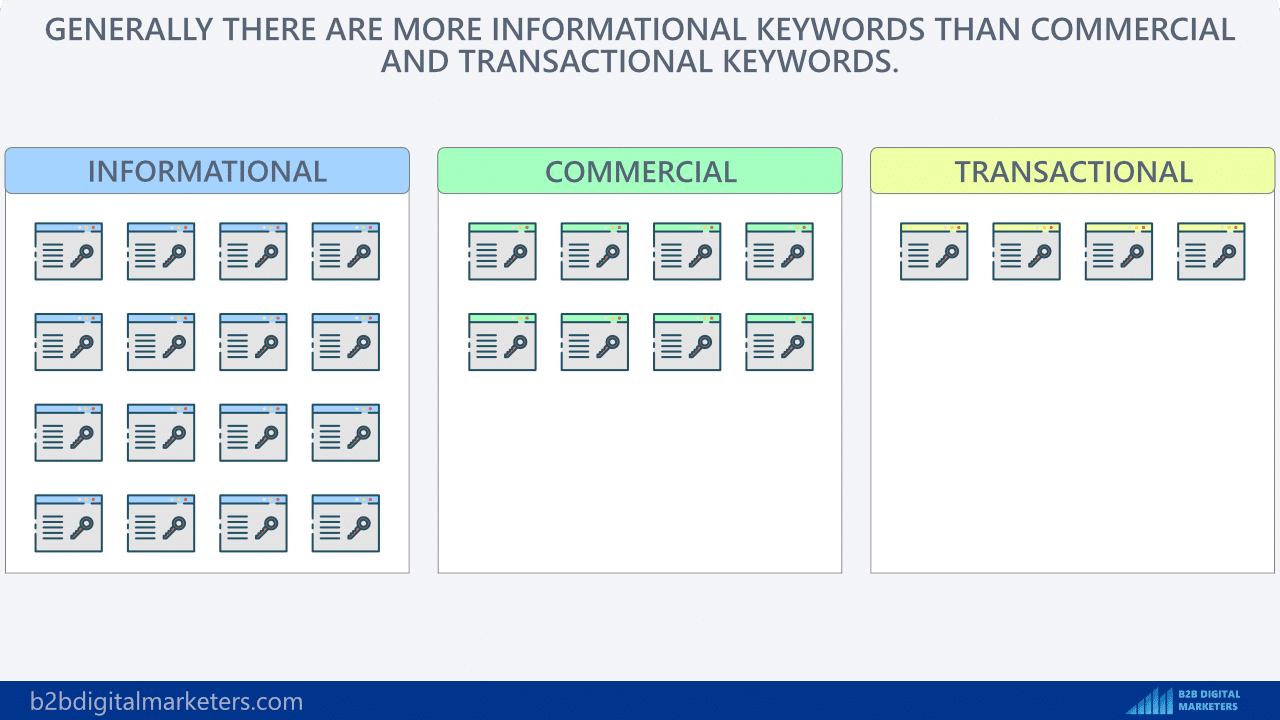
Therefore, by including informational keywords in your target keyword list and targeting them, you can significantly increase your website search visibility.
Also, because there are more informational keywords and they are less “profitable” it’s usually easier to find easy-to-rank keywords, especially long-tail keywords that you can target and start ranking high in search engine result pages (SERPs) even with less authoritative websites.
That’s why informational keywords are important as they can significantly boost your search visibility.
Reason #2: Drives Most Search Traffic
Another important reason why informational keywords are important is that in general, informational keywords are having higher search volume.
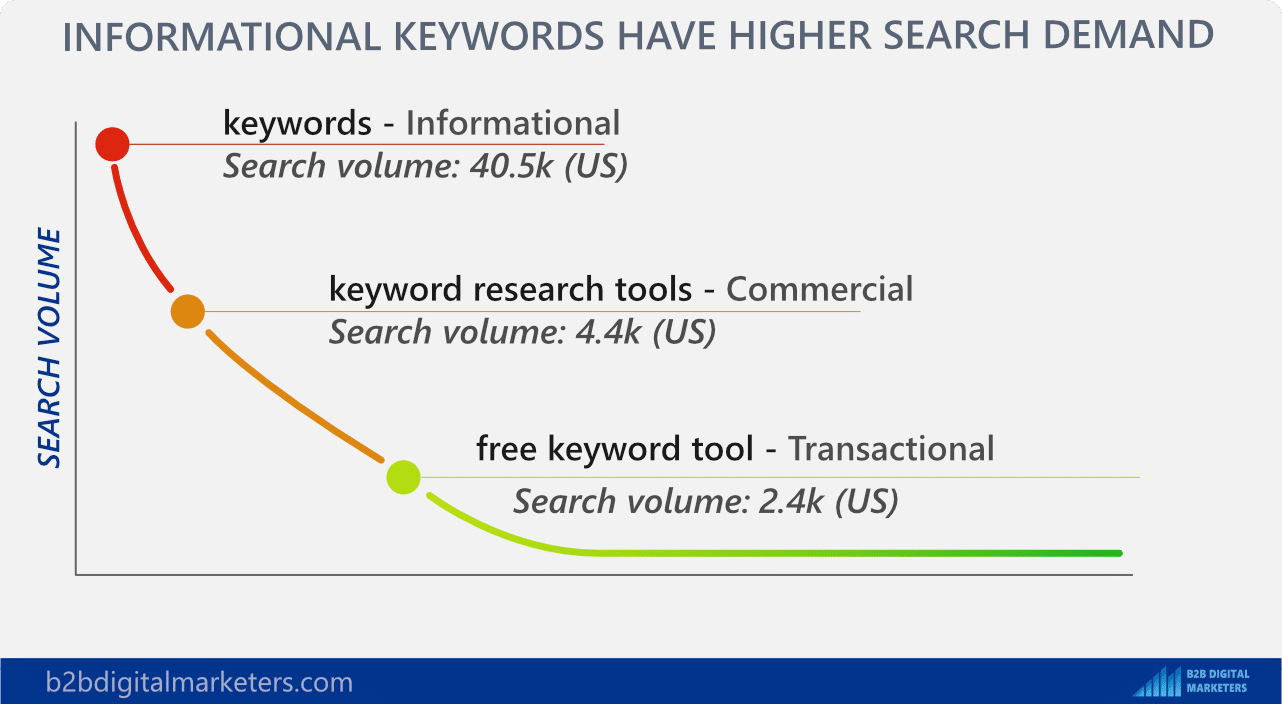
As said, usually there are more informational keywords, but they also have higher search demand and on top of that they can be easier to target resulting in more organic traffic for your website.
Of course, organic traffic doesn’t pay the bills, but by targeting the relevant keywords, you can be driving potential customers to your website boosting your brand awareness.
For example, HubSpot is targeting a ton of informational keywords related to their target audience in sales, marketing, and customer service departments resulting in 50+ million monthly visitors to their website and ranking for 12+ million keywords.
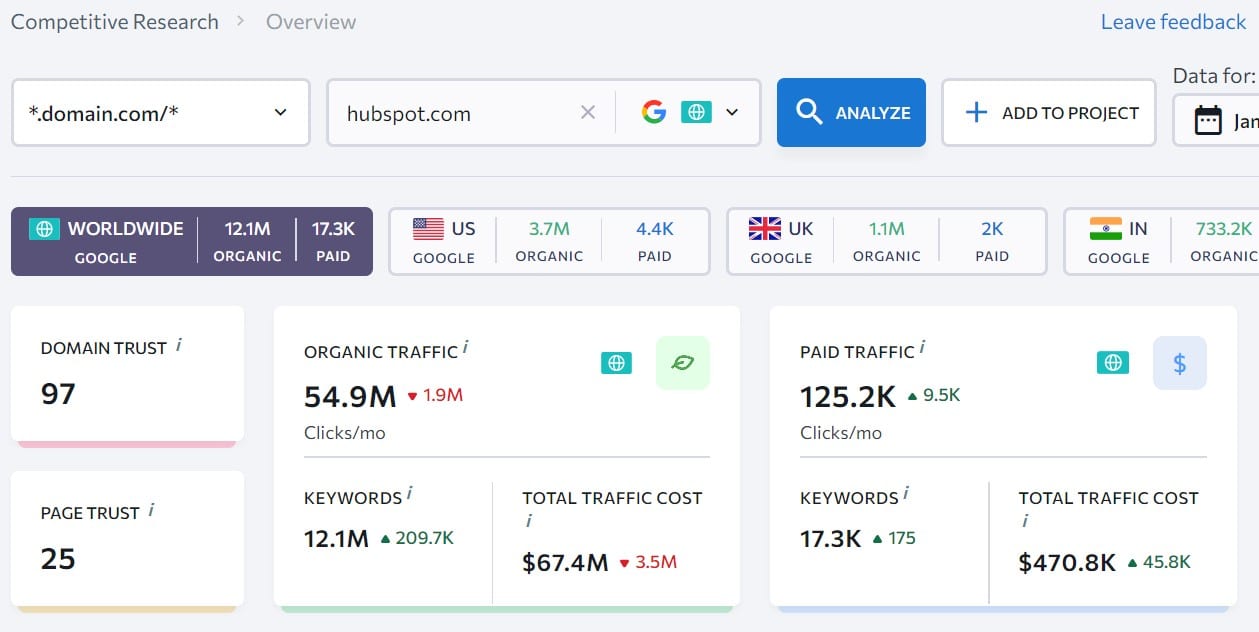
Of course, not everybody will buy from them, but trust me, if you ask any sales, marketing, or customer service representative if they know HubSpot, they will most likely say “yes”.
And 99% of that is because of their huge search traffic.
Reason #3: Increase Trust & Authority
As mentioned, informational keywords tend to be more numerous than commercial and transactional ones, providing a broader range of opportunities for content creation on your website.
This means you can produce more content relevant to your industry or niche, exploring deeper into specific topics and increasing your topical coverage.
This can help to attract a wider range of visitors to your website and establish you as an authority on the subjects you cover and boosting your E-E-A-T score, ultimately boosting your search engine rankings and driving more traffic to your website.
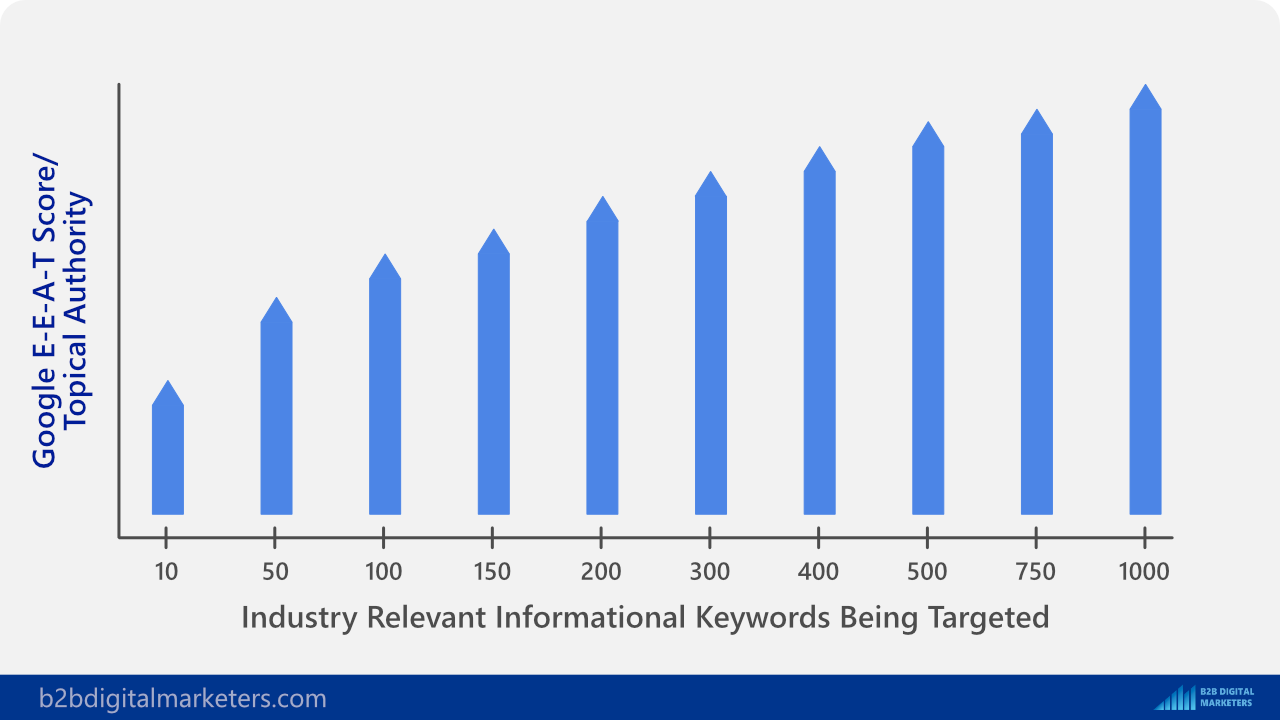
In addition to increasing your website’s content and topical coverage, creating helpful and informative content on informational topics can also help to build trust with users.
When your website is seen as a reliable and authoritative source of information, users are more likely to view your brand as an expert in the industry.
This can be especially beneficial when users are in the market for a solution that your business offers.
The previous exposure to your brand through informative content can influence their decision to choose your business over competitors when it comes time to make a purchase.
Reason #4: Brings Link Juice
Lastly, informational keywords are excellent for getting link juice as people are more likely to link to helpful content with valuable information compared to commercial or transactional content.
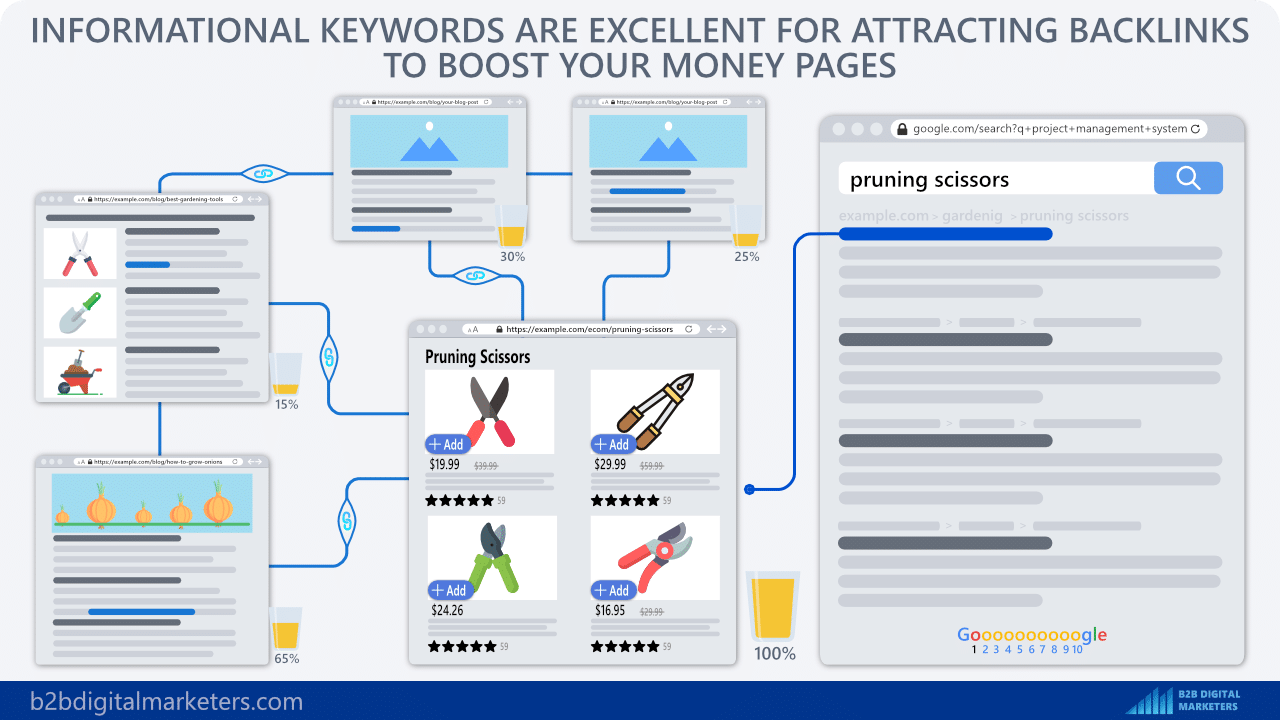
Thus, targeting informational keywords can help you attract high-quality backlinks to your website, resulting in a higher ranking for all your SEO keywords bringing more traffic and potential leads or sales for your business.
Four Types of Search Intent Keywords
Informational keywords are a type of search intent keyword used by SEOs to understand the users’ intent behind their search queries and create content that aligns with their needs.
Search intent means the reason behind the searcher query and by identifying the type of keywords being used, SEOs can create content that is tailored to meet the user’s information needs.
With that, here are all four types of search intent keywords:
- Informational: These keywords are used by users to gather knowledge, information, or understanding about a specific topic or subject. They are typically used when users are seeking answers to specific questions or looking for general information.
- Commercial: These keywords indicate that the user is in the research phase of the buying process and is looking for information about a product or service before making a purchase.
- Transactional: These keywords suggest that the user is ready to make a purchase and is looking for a specific product or service to buy. They are often associated with more specific, action-oriented keywords such as “buy” or “discount.”
- Navigational: These keywords are used by users who are looking for a specific website or page. They are often used to find a specific brand, product, or service.
Informational vs Commercial Keywords
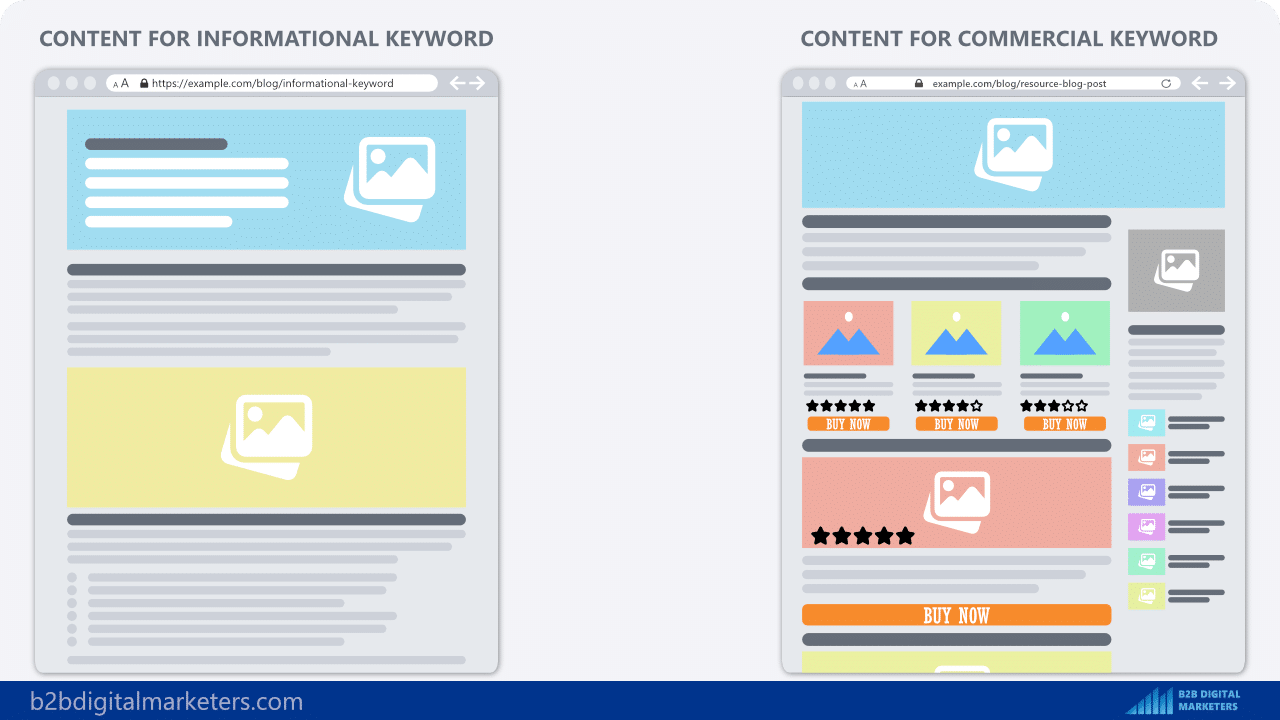
The main difference between informational and commercial keywords is that informational keywords are used by users to get information to solve problems, get answers to questions or learn something new whereas commercial keywords are used by users to compare or learn about different solutions to find the best solution that fits their needs, budget, and/or other criteria.
However, in most cases for both informational and commercial keywords, the type of content that will be ranking is blog posts.
But for informational keywords, it’s usually:
- Guides: The ultimate guides about something to provide you with all the information on any given topic. For example, an Ultimate guide to raised garden beds or a guide to construction safety, etc.
- How-to, what, why, when articles: Any articles that just want to answer your what, why, how, when questions. For example, “what is primary keyword” or “when ancient egypt ended” or “why to listen to experts”, etc.
- Infographics: In most cases, infographics are ranking for informational keywords, so if you see an infographic ranking, then it’s the most likely informational keyword. For example, “types of coffee”.
- Informational listicle posts: Any listicle post that focuses on teaching you something or listing only informational-related stuff such as “link building strategies”, “the highest mountains”, or “countries in europe” are all keywords with listicle blog posts, but are informational in nature.
Whereas for commercial keywords it’s only about:
- Product/Service listicle blog posts: These types of pages are only related to products or services, and they usually list down the best products or services sometimes specifically related to a certain industry, niche or requirements. For example, an article with a list of “keyword research tools”, ”copy ai alternatives”, “spyfu alternatives”, “accounting software for small business”, “garage cleaning services”, or “best pest control”.
- Comparison blog posts: These types of pages are only related to comparing certain products or services with each other. For example, “Samsung vs iPhone”, or “porsche cayenne vs mercedes gle” etc.
Informational keywords are used by buyers at the beginning of their journey to gather information and learn about anything.
These keywords are used to target buyers at the top of the SEO funnel (TOFU) stage and are used to drive awareness.
They typically do not result in leads or sales, as the users searching for these keywords are not yet ready to buy. An example of an informational keyword might be “how to grow onions”.
Commercial keywords, on the other hand, are used by buyers who are further along in their journey and are showing interest in purchasing a product or service.
These keywords are used to target buyers at the middle of the funnel (MOFU) stage. The users searching for these keywords are likely to consider making a purchase. An example of a commercial keyword might be “best gardening tools”.
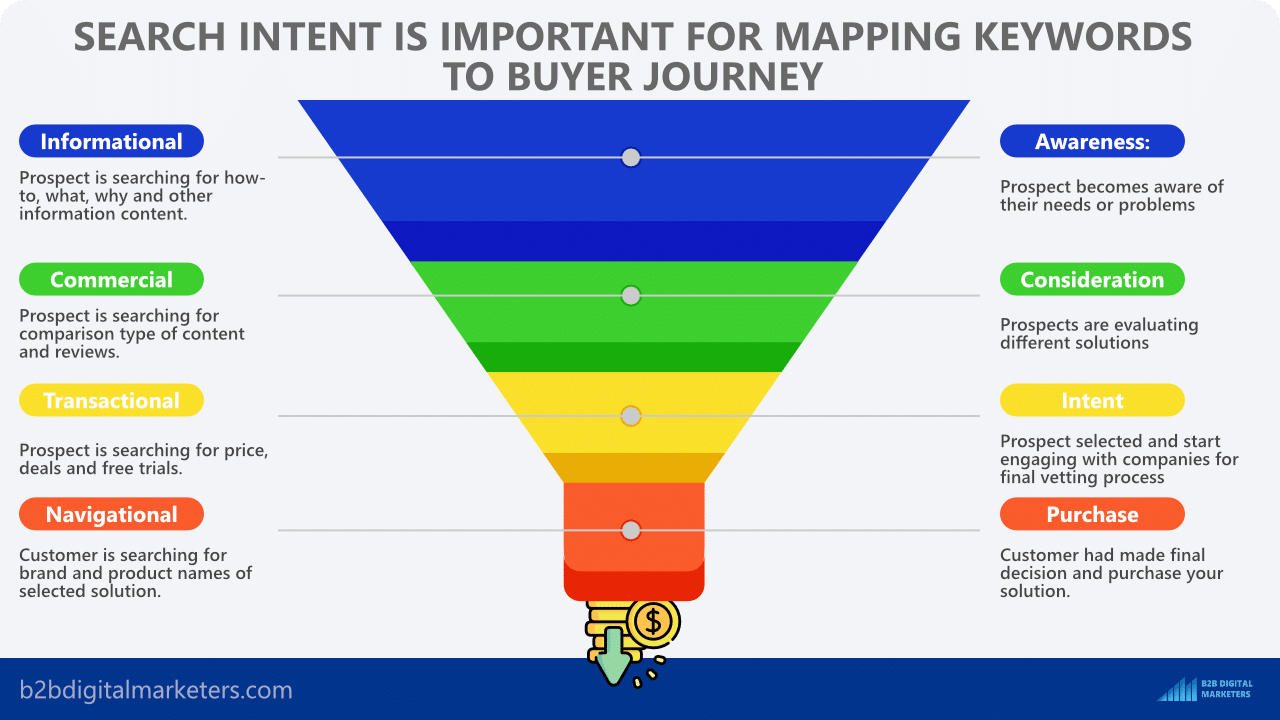
Informational vs Transactional Keywords
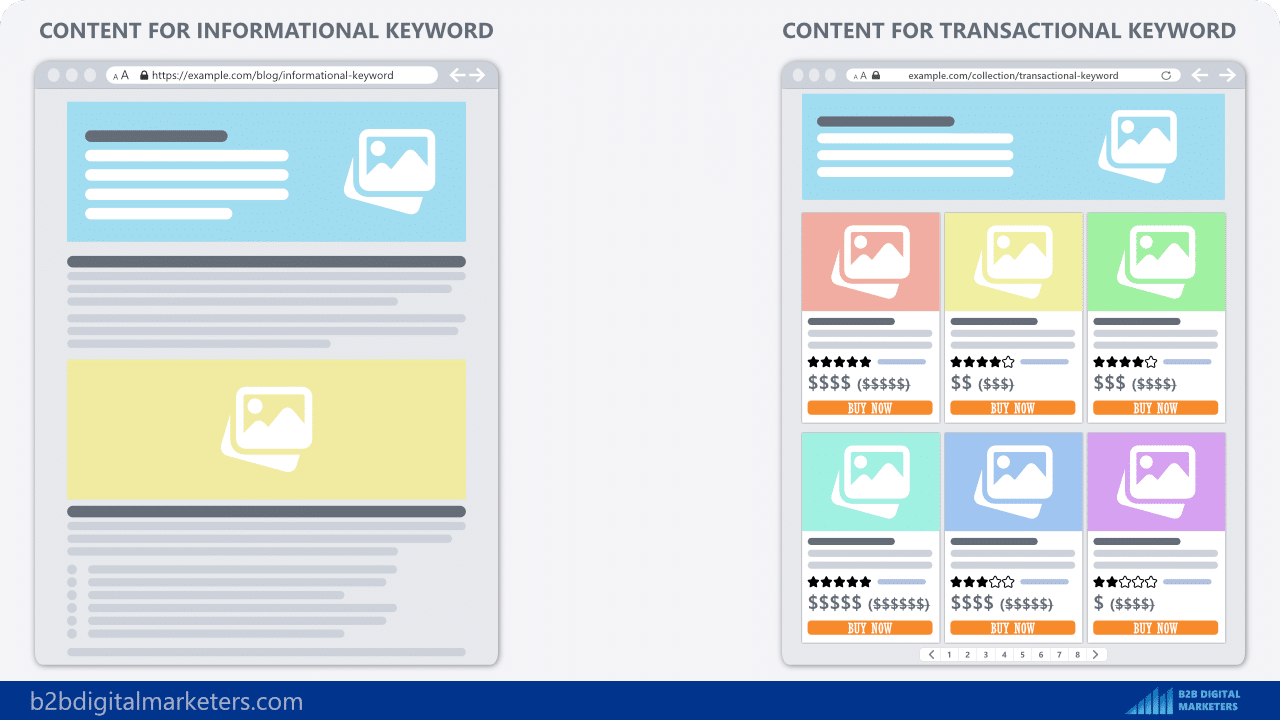
Informational keywords are used by users who are looking for information or knowledge about a specific topic. Examples of informational keywords could be “how to grow onions from seed”, “types of onions”, “onion planting guide”, or “when to harvest onions”.
These keywords are used by users who are at the very beginning of the research phase of the buying journey and are looking for general information about the topic.
Transactional keywords, on the other hand, are used by users who are actively searching for a product or service and are ready to make a purchase and just want the best deal. Examples of transactional keywords might include “buy onion sets”, “onion seedlings for sale”, “organic onion bulbs”, or “where to buy onion plants”.
These keywords are used by users who are in the purchase phase of the buying journey and are looking to make a transaction.
In addition to the differences in the intent of users searching for informational and transactional keywords, the specific content types that appear for each type of keyword can also vary.
For informational keywords, content that appears in search results is typically educational in nature, such as blog posts, articles, and how-to guides.
These types of content provide users with general information and knowledge about a topic and are often created to help users at the top of the funnel (TOFU) stage of the buying journey.
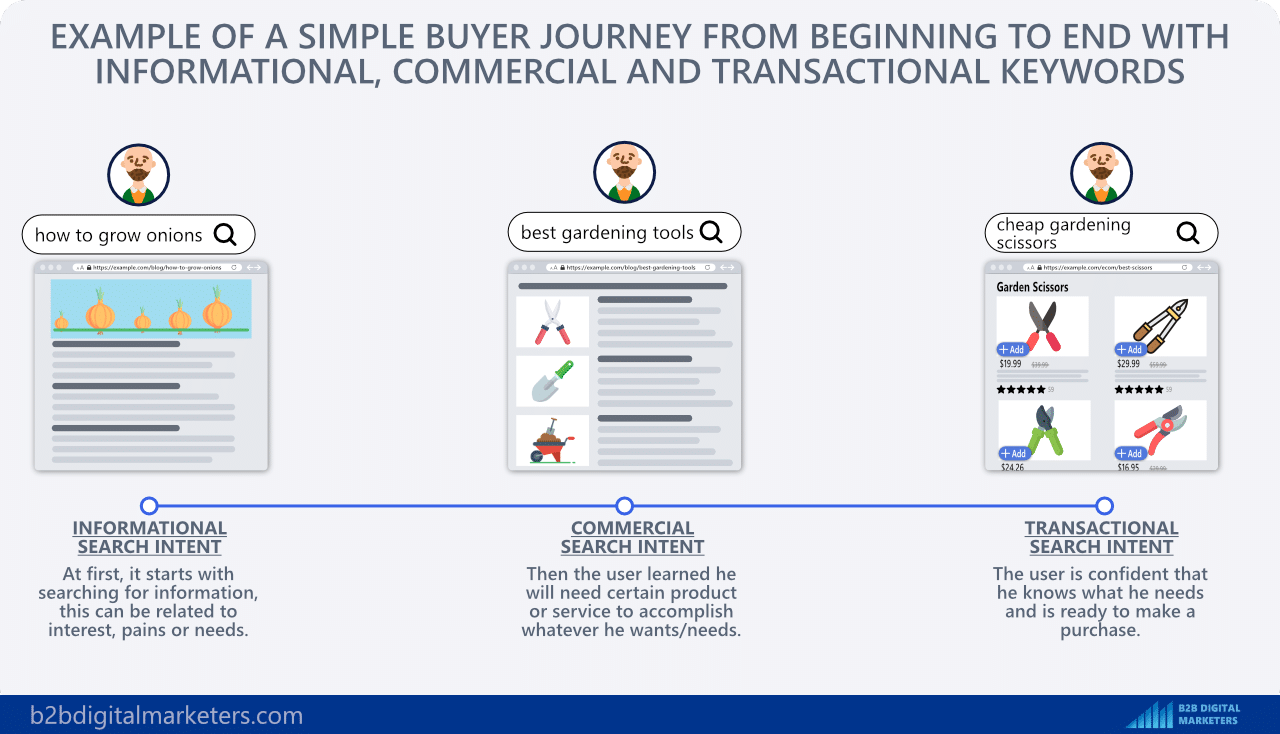
For example, when someone searches for “how to grow onions from seed,” they might find blog posts, articles, or video tutorials that provide them with tips and instructions on how to plant and care for onion seeds.
On the other hand, for transactional keywords, content that appears in search results is typically more commercial in nature, such as product/service pages, e-commerce listings, and online store websites.
These types of content are designed to help users at the middle or bottom of the funnel (MOFU/BOFU) stage of the buying journey, who are looking to make a purchase.
For example, when someone searches for “buy onion sets” they may find online store websites or e-commerce listings that provide them with options to purchase the onion sets.
In summary, informational keywords are used by users who are looking for general information about a topic, while transactional keywords are used by users who are looking to make a purchase and the type of content that appears in search results for informational keywords is generally educational and designed to provide users with general information and knowledge, while the type of content that appears in search results for transactional keywords is more commercial and designed to help users make a purchase.
How to Identify Informational Keywords?
For most keywords, you will be able to guess what the search intent is just by using common sense and drawing from your own experience of searching on the internet.
And these keywords often include words such as “how”, “what”, “why”, “when”, “where”, and “who.” They may also include phrases such as “how to”, “definition of”, “history of”, “explanation of”, and “information on”.
However, with those less obvious keywords, here is a step-by-step process on how to identify informational as well as other types of keywords.
Step #1: Check Keyword Modifiers
The first step to identifying keyword search intent is to check the keyword modifiers.
Here is an infographic with keyword modifiers and more information that will help you indicate a certain type of search intent:
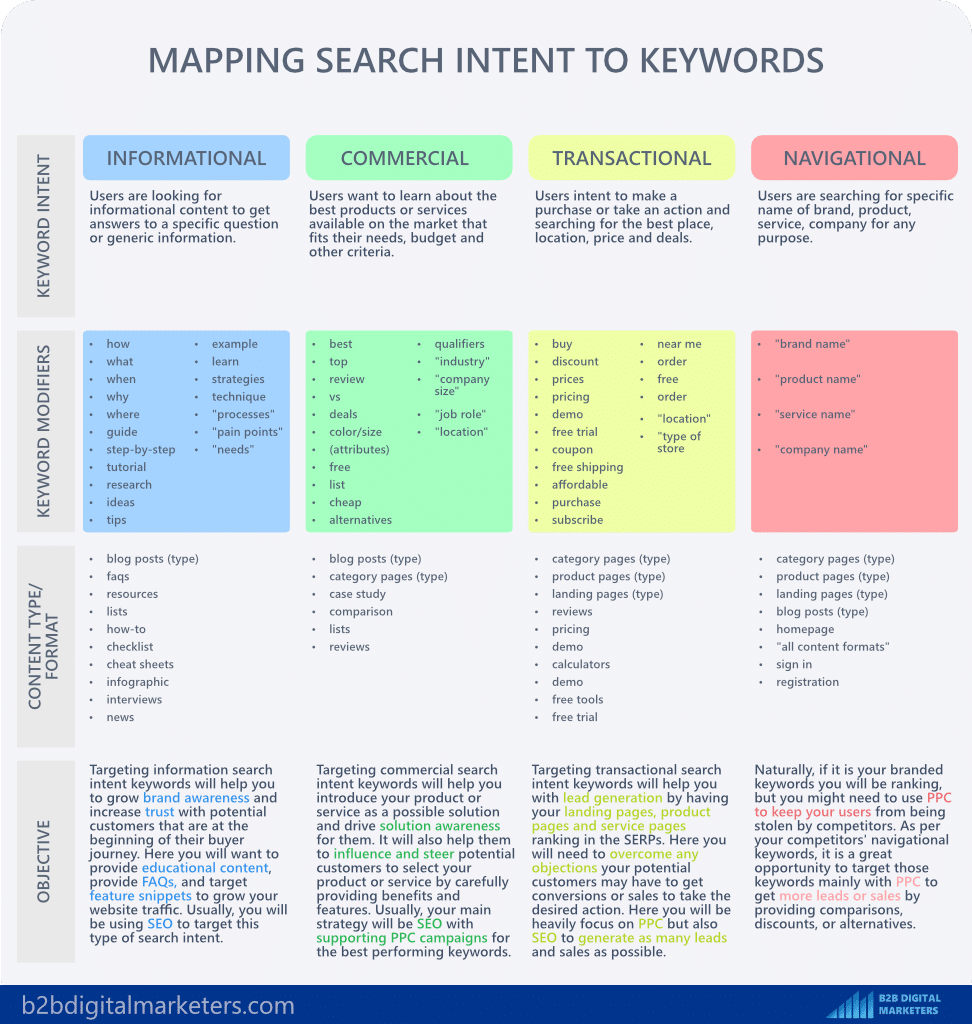
This will help you to speed up the process of identifying and mapping informational or any other type of search intent keywords.
For example, the keyword “how to stop a nosebleed” is obviously an informational keyword just by looking at the keyword modifier “how”.
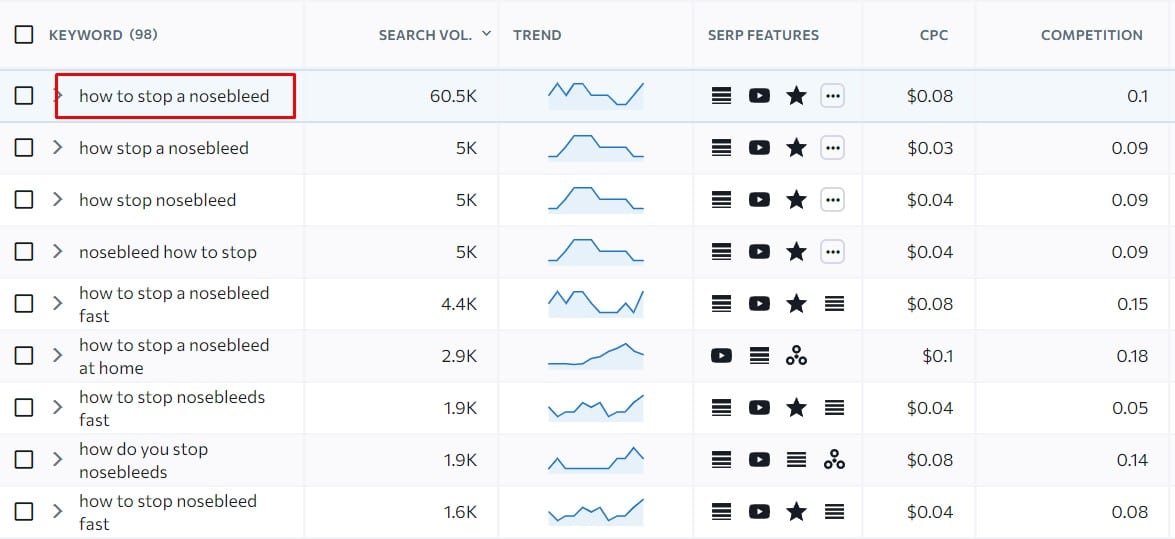
However, if the keyword is not so obvious then let’s do the next step.
Step #2: Analyze SERPs
The second step to determine keyword search intent and identify informational keywords is to analyze the search engine result pages (SERPs) for the keyword.
Luckily, we don’t need to figure out what people want, when they type any given query as Google is spending billions of dollars to figure out the user search intent, and depending on the results you can pretty accurately determine the search intent.
So, to determine keyword search intent, you will look at the SERPs and check out the titles, and what keyword modifiers and SERP features are present there.
With that, to analyze SERPs for keywords I will be using SE Ranking keyword research tool, to remove any personalization and for you to get used to identifying search intent just by using a keyword research tool as it is much quicker when you do keyword research.
Here are a few examples to better understand.
Keyword Example #1: “flu symptoms”.
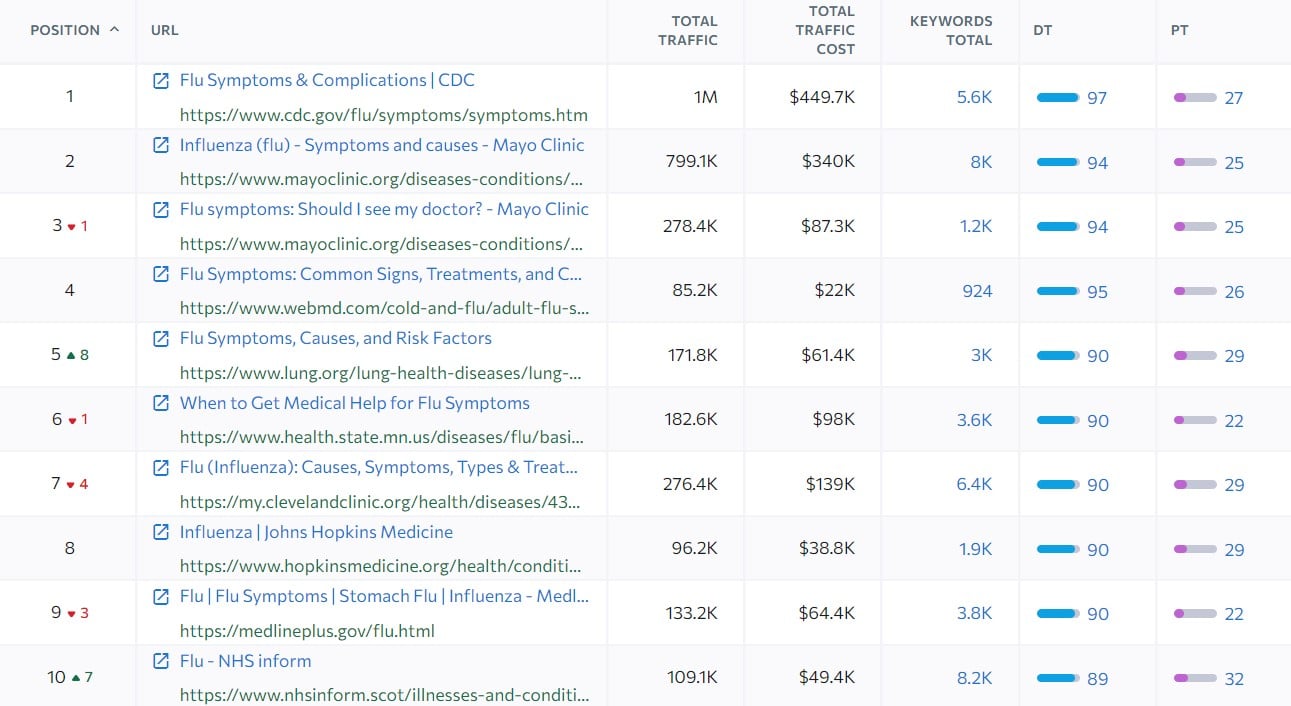
By looking on SERPs for this keyword, I can see there are not many keyword modifiers (such as what, why, how, and when) that will indicate the search intent.
However, just by looking at the titles, it’s pretty clear that these titles and URLs of the pages indicate this keyword is 100% informational as there are no product pages, list of best products, or comparisons.
Also, by looking at the SERP features, I can see this is an informational keyword.
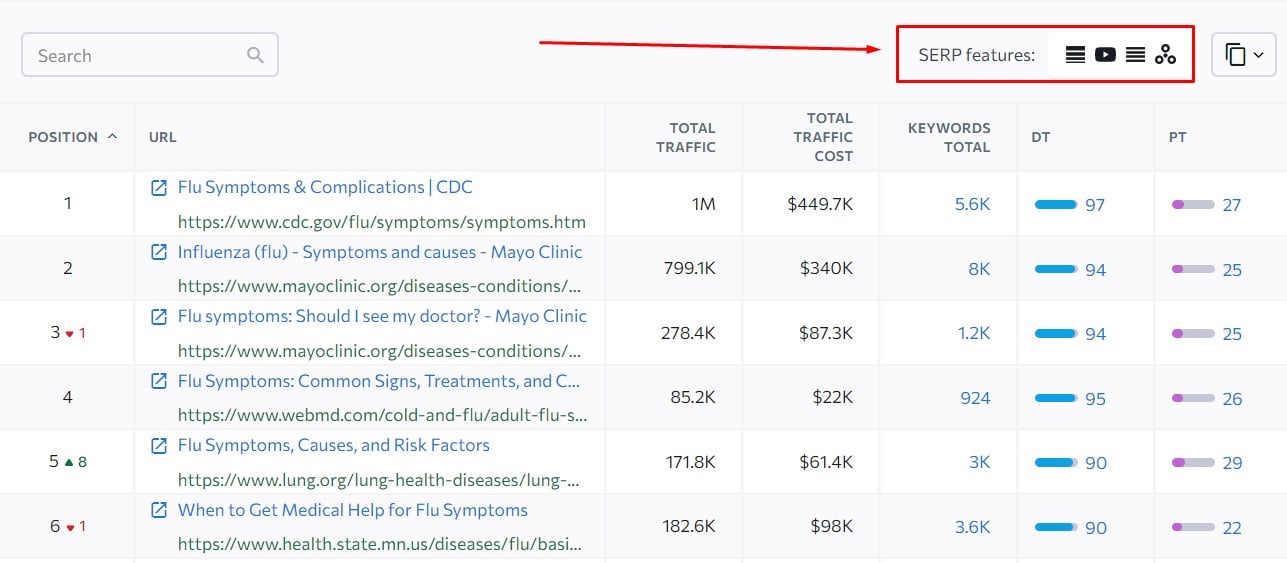
I can also visit the pages, to see if they are informational or commercial in nature, but in this case, it’s obvious they will provide information on flu symptoms, causes, and treatment and not a list of medical products to resolve flu. (BTW if you are a medical specialist check out my Local SEO for Doctors.)
Keyword Example #2: “affordable engagement rings”
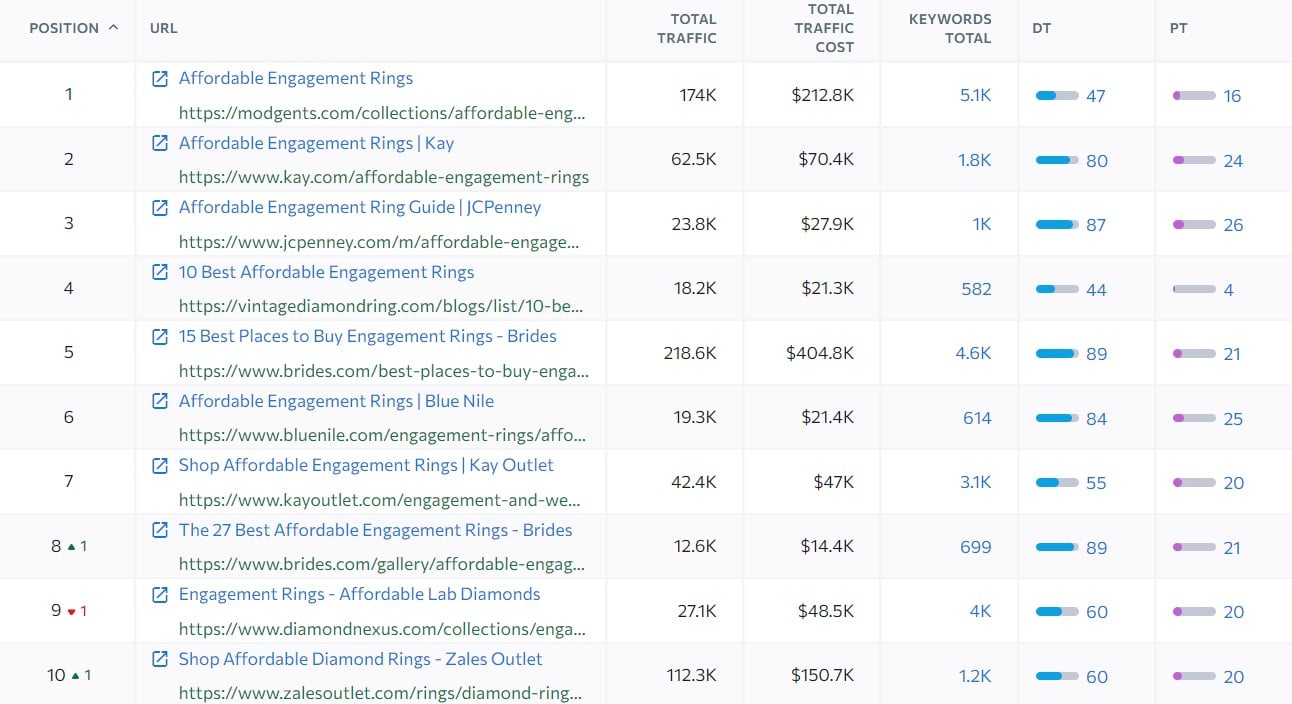
Based just by looking at the SERP I can see that this keyword is between transactional and commercial keywords because most of the ranking pages are category/collection pages.
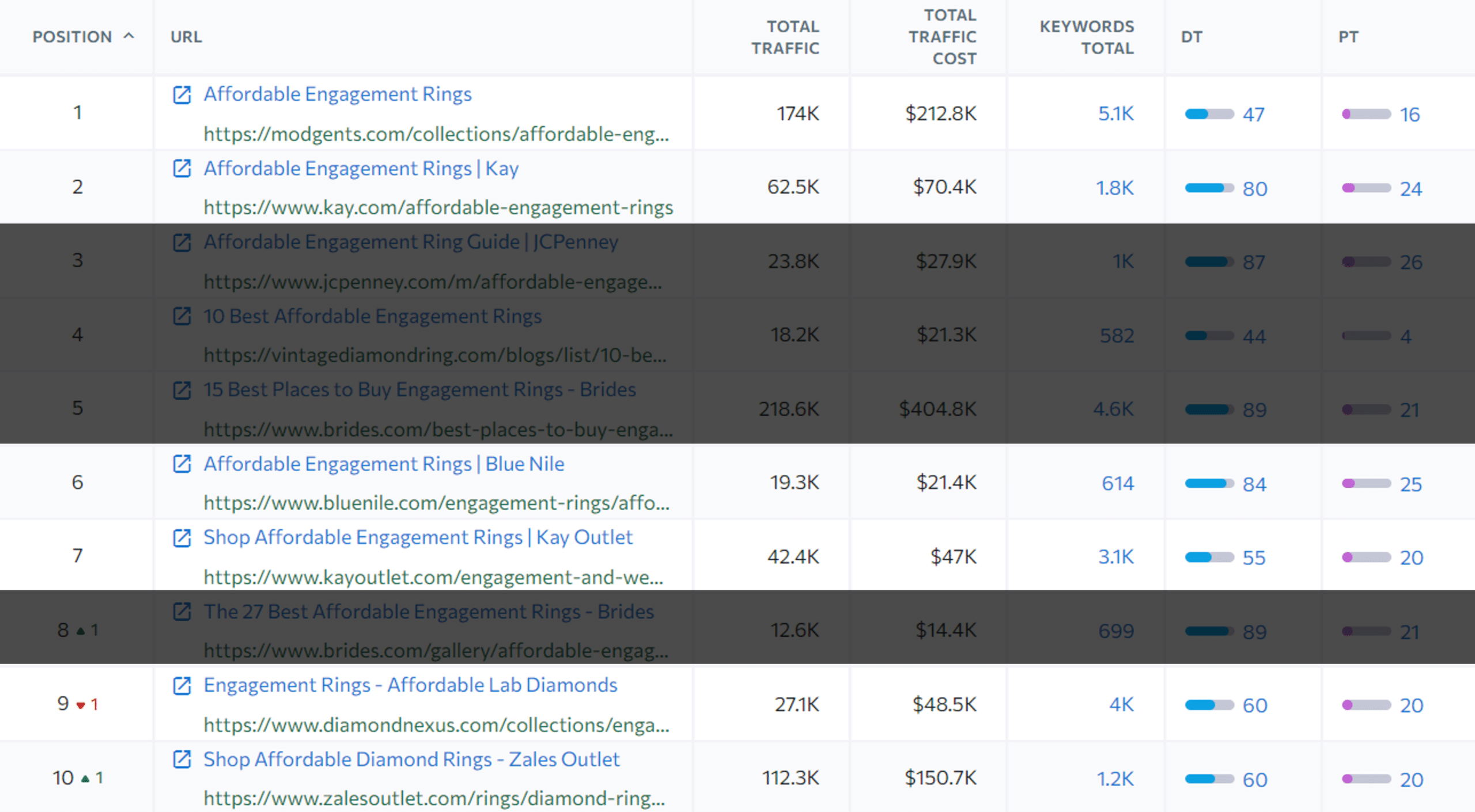
Also, with a few listicle blog posts showing the list of best affordable rings.
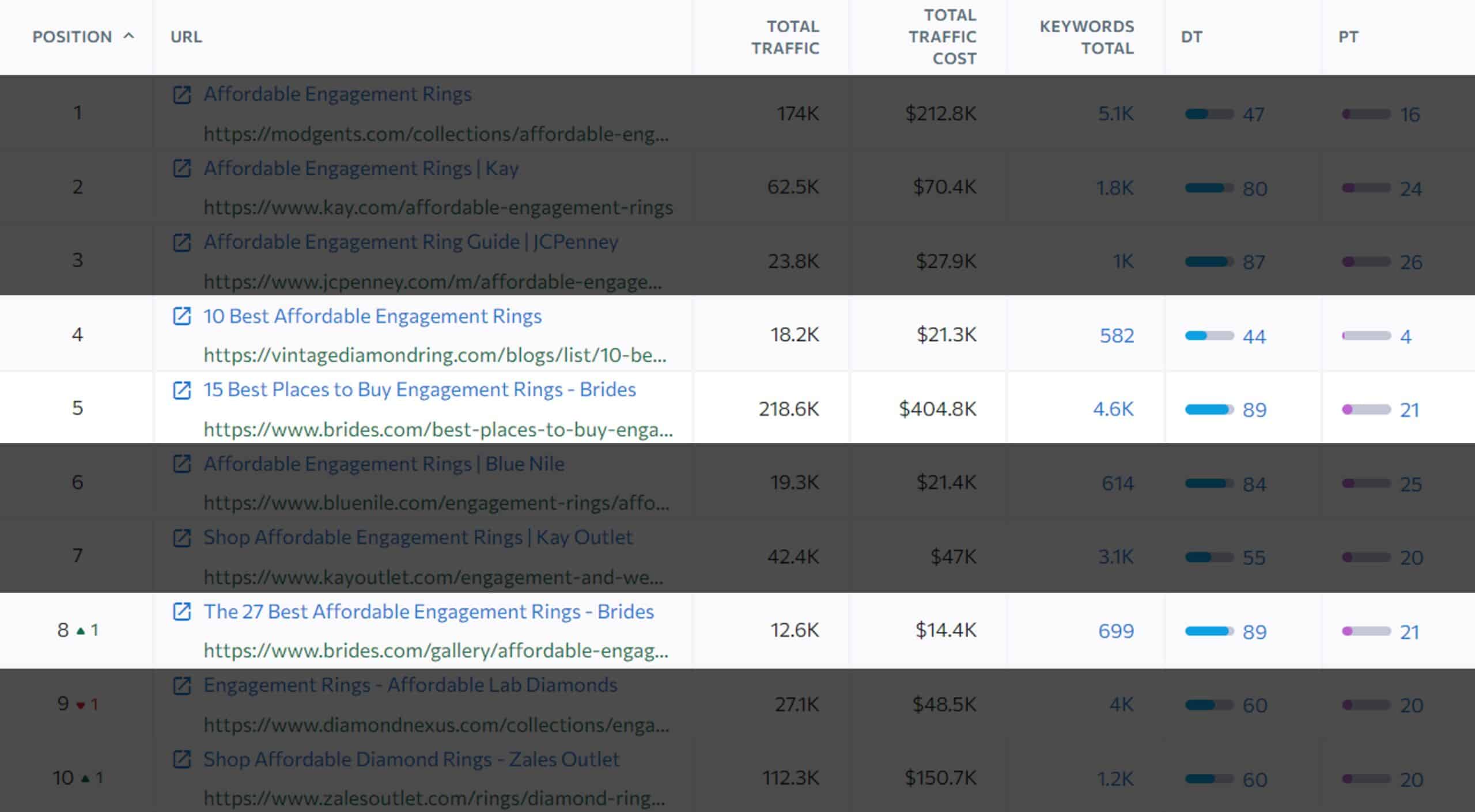
And again, I can go through the pages if they are informational or commercial type. In this example, I would see eCommerce pages or blog posts with a list of affordable engagement rings.
So just like this, you will analyze the SERPs for your target keyword to determine what type of search intent the keyword is as well as what type of content you should create to be able to rank for the keyword.
7 Informational Keywords Best Practices
In order for you to properly implement informational keywords into your content marketing plan, here is a list of 7 best practices for informational keywords:
Practice #1: Target 80% Informational Keywords
The first and super important best practice for informational keywords is to target around 80% informational and 20% commercial and transactional keywords.
Since 2020, Google has been releasing a series of algorithm updates that were aimed at affiliate marketers who only or predominantly target commercial and transactional keywords for profit.
Mostly their updates were going around providing helpful content and product reviews update.
However, this does not only apply to affiliate marketers and basically to anybody who is producing commercial and transactional content.
And according to Matt Diggity’s research, the commercial vs information content ratio is important to avoid any loss of rankings or being able to rank in Google searches.
And the average % for informational vs commercial content is around 70% and 30% respectively.
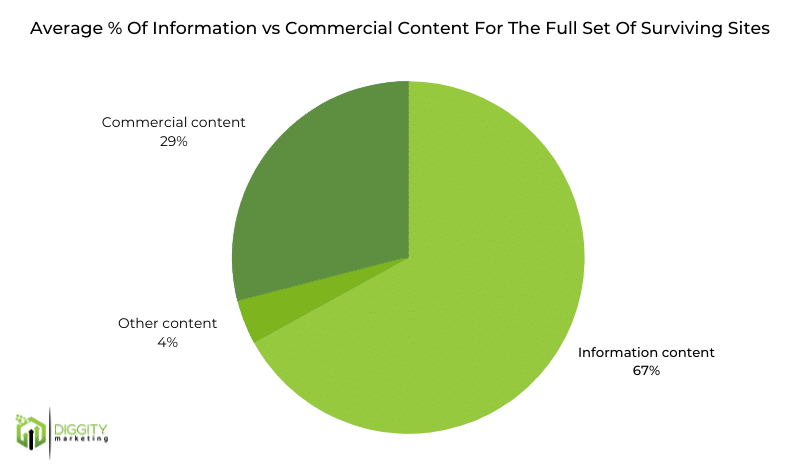
However, I recommend keeping the ratio around 80/20 of informational and commercial/transactional content to further improve your topical relevancy for your most important profitable keywords and for more reasons that I will talk about later.
Practice #2: Drive Awareness & Visibility
Another important informational keyword best practice is to drive awareness and visibility for your products or services and obviously your brand as well.
As shown, informational keywords usually have higher search demand and can be easier to rank for which allows you to promote your products or services there.
However, there are millions of informational keywords that you could possibly target, many of which have very little to do with your own business.
So, to maximize your marketing efforts, drive the best results and target only the most relevant informational keywords to your business, you will need to analyze the business potential.
The key is to analyze the business potential of the keyword or how easy is to include or mention your product or service within the article without making it unnatural or forced.
To find the keyword business potential you will need to ask yourself the following questions:
- Is this keyword relevant to my business?
- Would be the users interested in my solution?
- Can I naturally include my solution within the post?
- And are they ready to buy? AKA where are they in the buyer journey?
By asking these questions you will be able to easily assign a score between 0-3, 0 means no business potential, and 3 great revenue-generating potential. Here is a guideline I am using to analyze keyword business potential with an example for Whiskey E-Commerce Store:
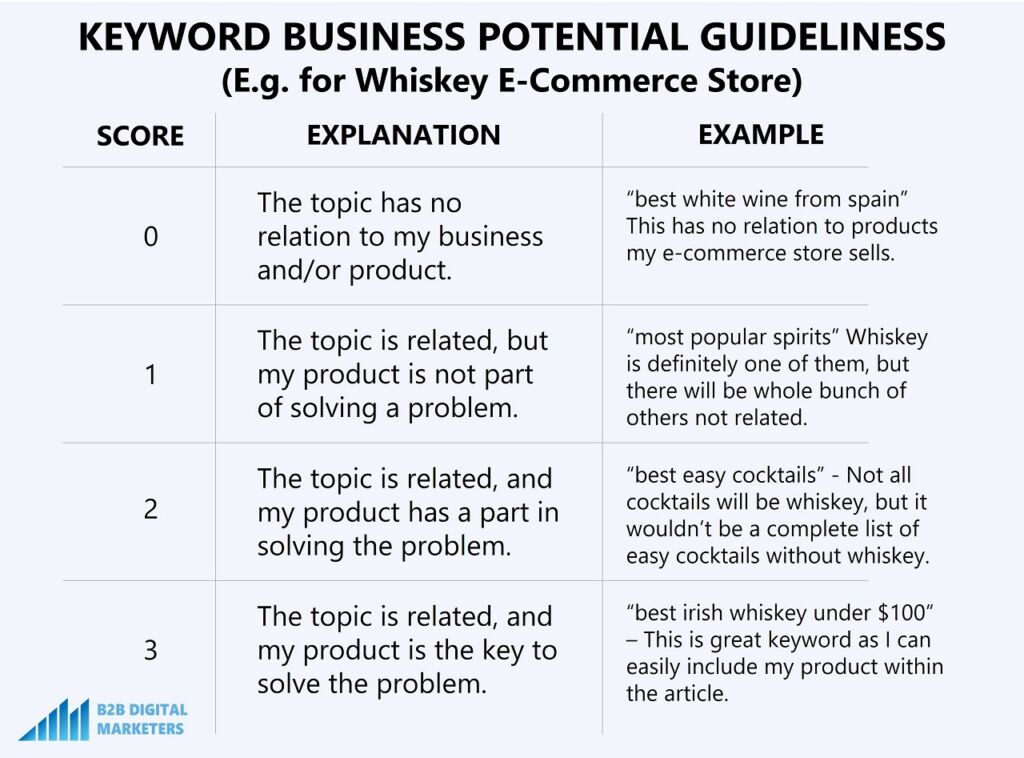
Remember, if the answer to the first two questions is no, then you obviously don’t want to waste your time on these. The third question is about the lead generation ability of the keyword and the last question is about where the user is in the buyer journey.
For example, HubSpot is producing hundreds of pieces of content every month, yet some have absolutely nothing to do with their businesses such as the article on “how to type shrug emoji ¯\_(ツ)_/¯”
Yes, they have a huge number of resources to create unrelated content, but I doubt you can afford to do that.
So, you will want to analyze the keyword business potential to maximize your resources and target only the best keywords.
For example, I targeted the keyword “keyword analysis” which I rated on the business potential scale as “2”.
The reason for that is that my business model is based on promoting other digital marketing tools, and when I asked myself the following questions:
- Is this keyword relevant to my business? Yes, it is very relevant, as it is about SEO.
- Would be the users interested in my solution? Yes, they could be.
- Can I naturally include my solution within the post? Yes, keyword research tools are part of solving the problem.
- And are they ready to buy? AKA where are they in the buyer journey? Maybe, most likely they already have a keyword research tool if they do keyword analysis.
That’s why I rated this keyword “2” on the scale and since then it brought a couple of leads and sales for me.
Therefore, once you create your list of keywords, make sure to include the business potential for each keyword.
Practice #3: Support Commercial/Transactional Keywords
Another important best practice for informational keywords is to target informational keywords that support your commercial and transactional keywords.
This will help you to follow the 80/20 ratio as well targeting only the most relevant keywords to drive awareness and visibility for your brand’s products or services.
To do that you will need to create a topic cluster around your core products or services.
For example, if you are in the construction business and one of your core services is commercial construction, then you would create a topic cluster from the main category or seed keyword “construction”.
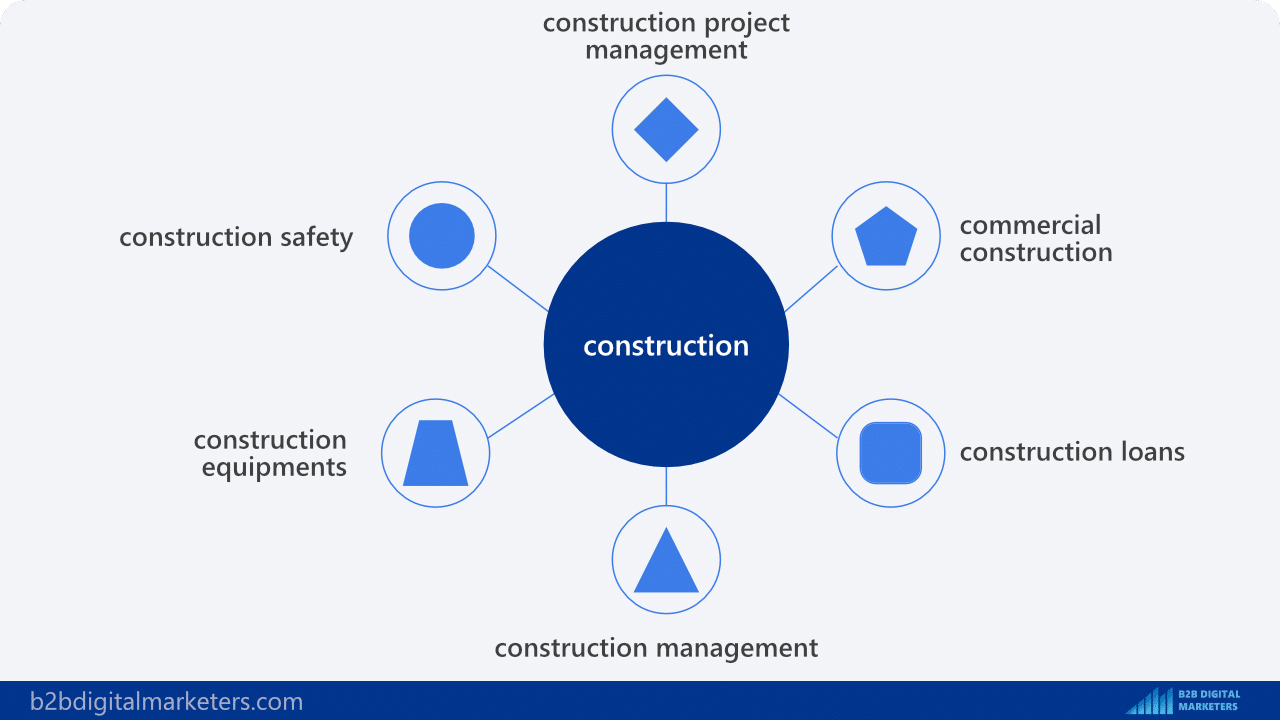
To do that you can go to a keyword research tool such as SE Ranking, type your main category/seed keyword into the tool, select the target location and click on analyze.
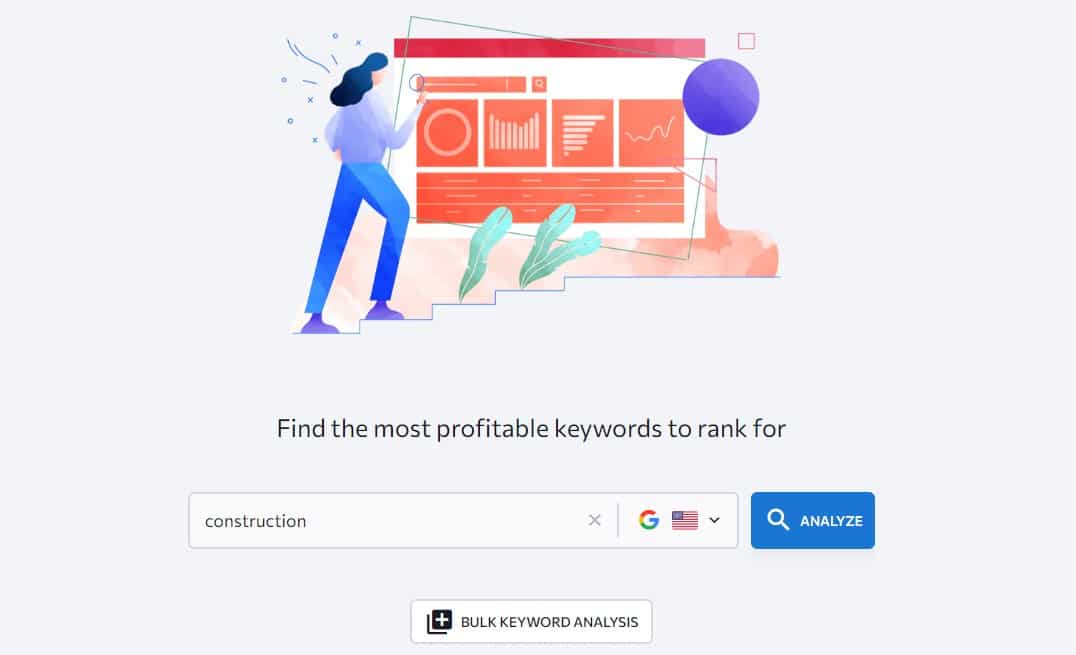
And then from the Keyword Suggestions tool you would hand-pick any related keywords that you can target by creating a product/service page, category page, or blog post.
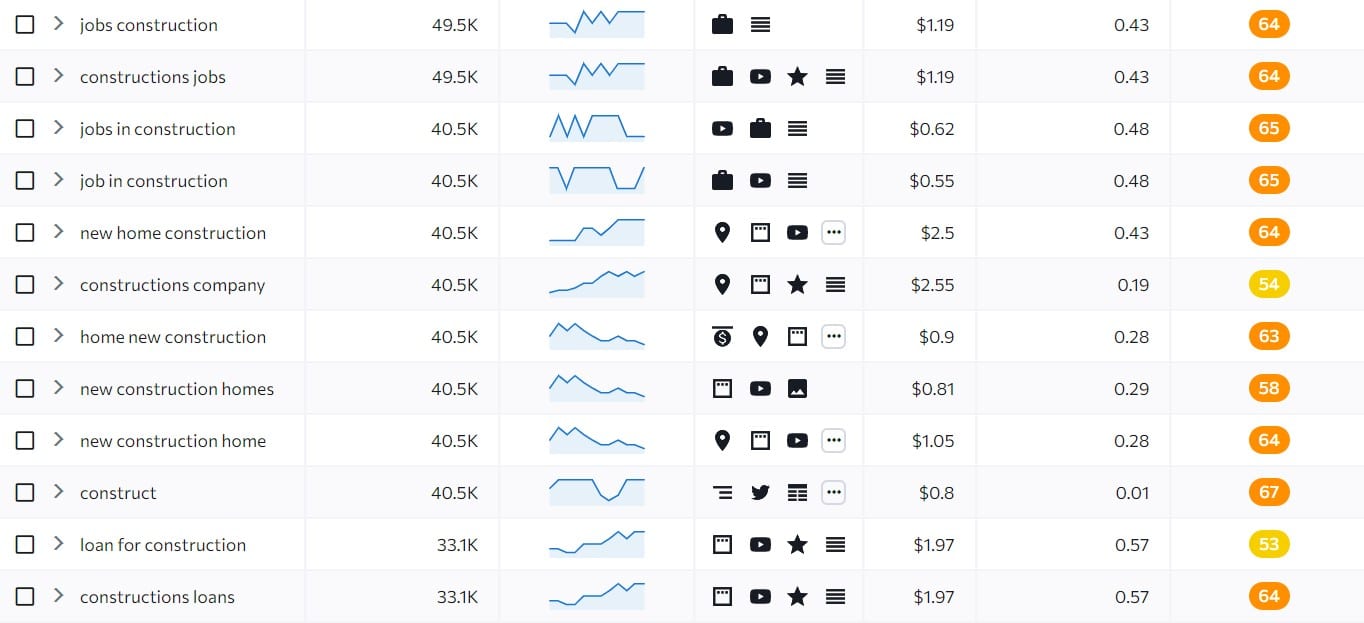
Then you would start creating your content by targeting your main SEO keywords related to your topic cluster and most importantly connecting those pages from the same topic cluster with internal links.
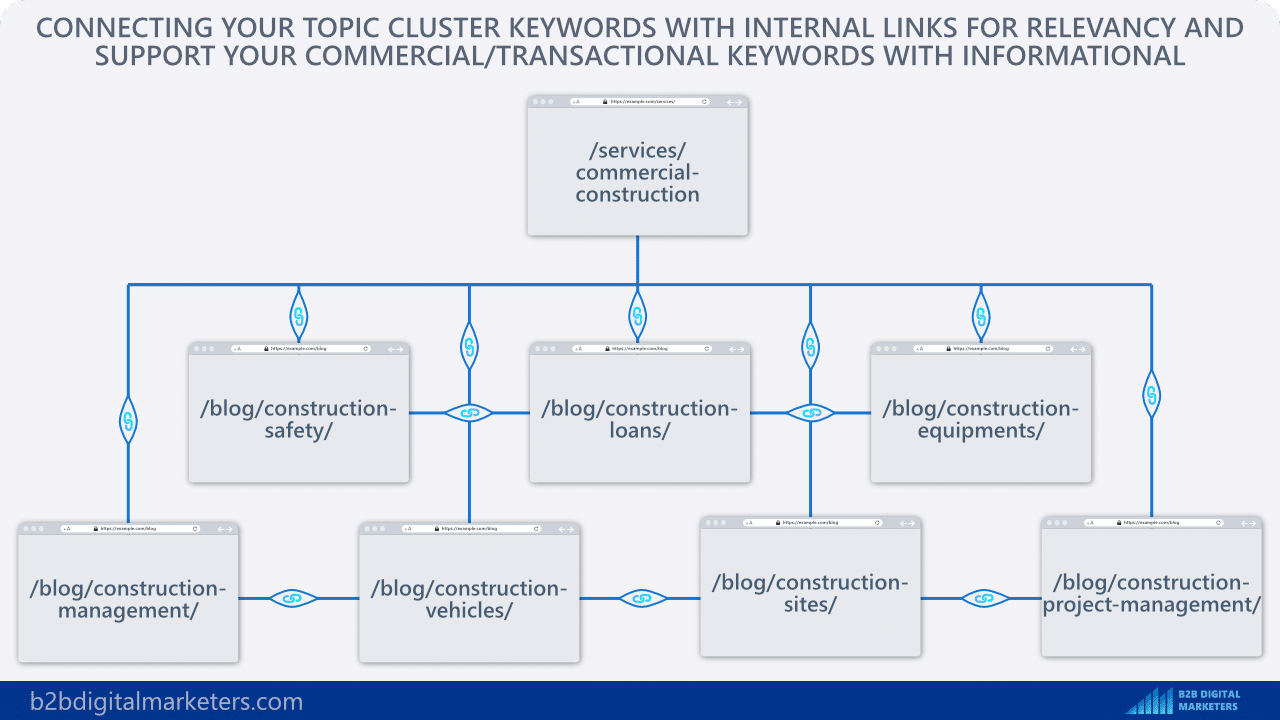
BTW if you want to learn more about SEO for Construction, check out my guide.
Practice #4: Generate Link Juice with Information Keywords
The next super important best practice for informational keywords is to use them to generate high-quality backlinks and then pass the link juice to your commercial and transactional pages.
As shown from previous best practice, you should create topic clusters for your most important products or services and then connect all the pages with internal links which will allow you to pass the link juice to your most important money pages so you can rank on top and generate leads and/or sales for your business.
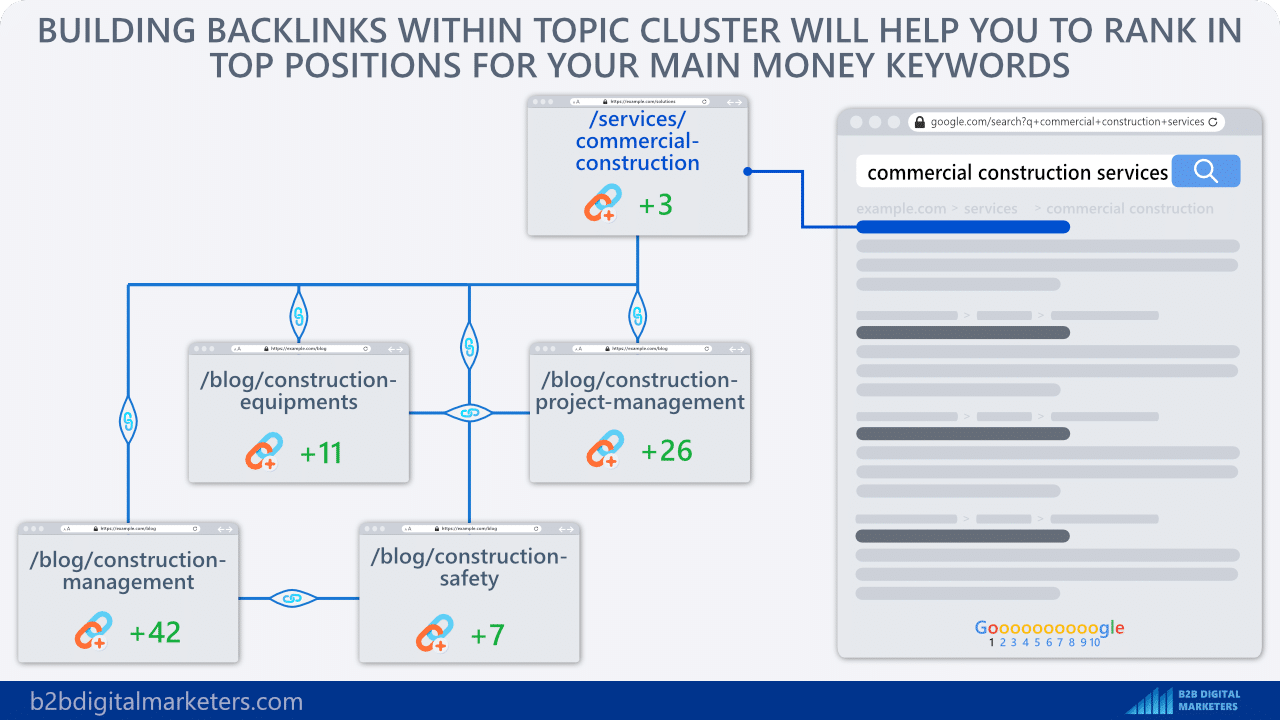
The reason for that is that you cannot simply flood your product or service pages with tons of backlinks to rank at the top, as it is unnatural, and Google would quickly penalize you!
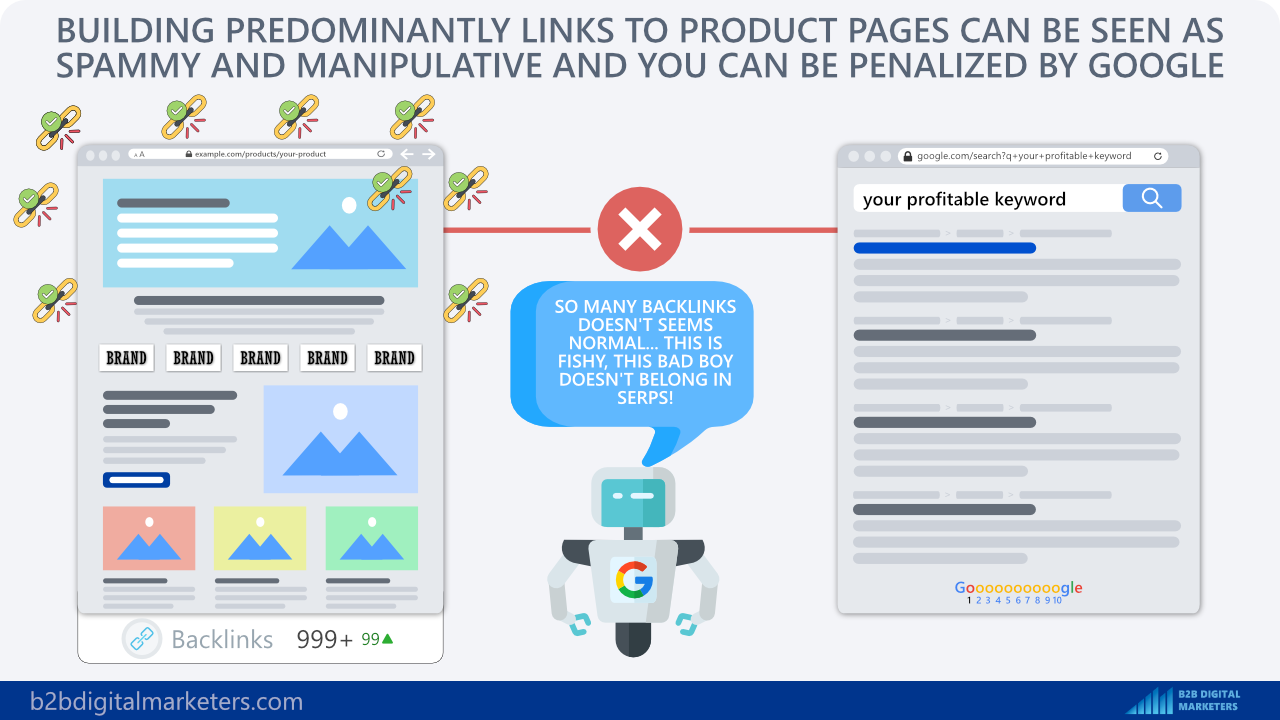
So instead, when you do link building, you want to build mostly links to your informational keywords as it’s much more natural. I recommend building niche-relevant backlinks or contextual backlinks.
Practice #5: Have Proper Keyword Placement
When it comes to informational keywords or any primary keywords that you want to target, having proper on-page SEO will ensure users and search engines easily understand what is your page about.
As said by John Mueller,
“I would recommend that if there’s something that you want to tell us that your page is about, to make that as visible as possible.”
This means including your target keyword in important parts of your page such as:
- Title tag: This is the main headline in the SERPs for each page. I recommend including your primary keyword towards the beginning for relevancy purposes.
- Meta description: This is the short description under the headline in the SERPs. I recommend creating a short description and selling your article with a primary keyword at the beginning.
- URL: To create SEO-friendly URL, I recommend only including the primary keyword within your URL. For example, my article on backlink analysis has only the keyword “backlink analysis” in the URL.
- Introduction: I recommend starting your article with a clear and engaging introduction that includes your primary keyword. This will give readers an idea of what the article is about, while also signaling to search engines what the content is about.
- Headlines: I recommend using your primary keyword in at least one of the headlines (H1, H2, H3) in the content to create SEO-friendly headlines. This will help to break up the content into sections and make it easier for readers to understand, while also signaling to search engines what the main topic of the content is.
- Images: For SEO images I recommend using your primary keyword as the file name and alt text for images within the article. This will help search engines understand what the image is about, and also give readers a better understanding of what the image is relevant to in the context of the article.
- Content: I recommend including your primary keyword throughout the article in a natural and contextually relevant way, but not overdoing it. Also, try to include LSI keywords & secondary keywords in the content, it will help to give more context to the primary keyword and will show the search engine that the content is relevant and of high quality.
If you are using WordPress you can check out my guide on where and how to add keywords to WordPress and use this infographic as your keyword placement checklist:
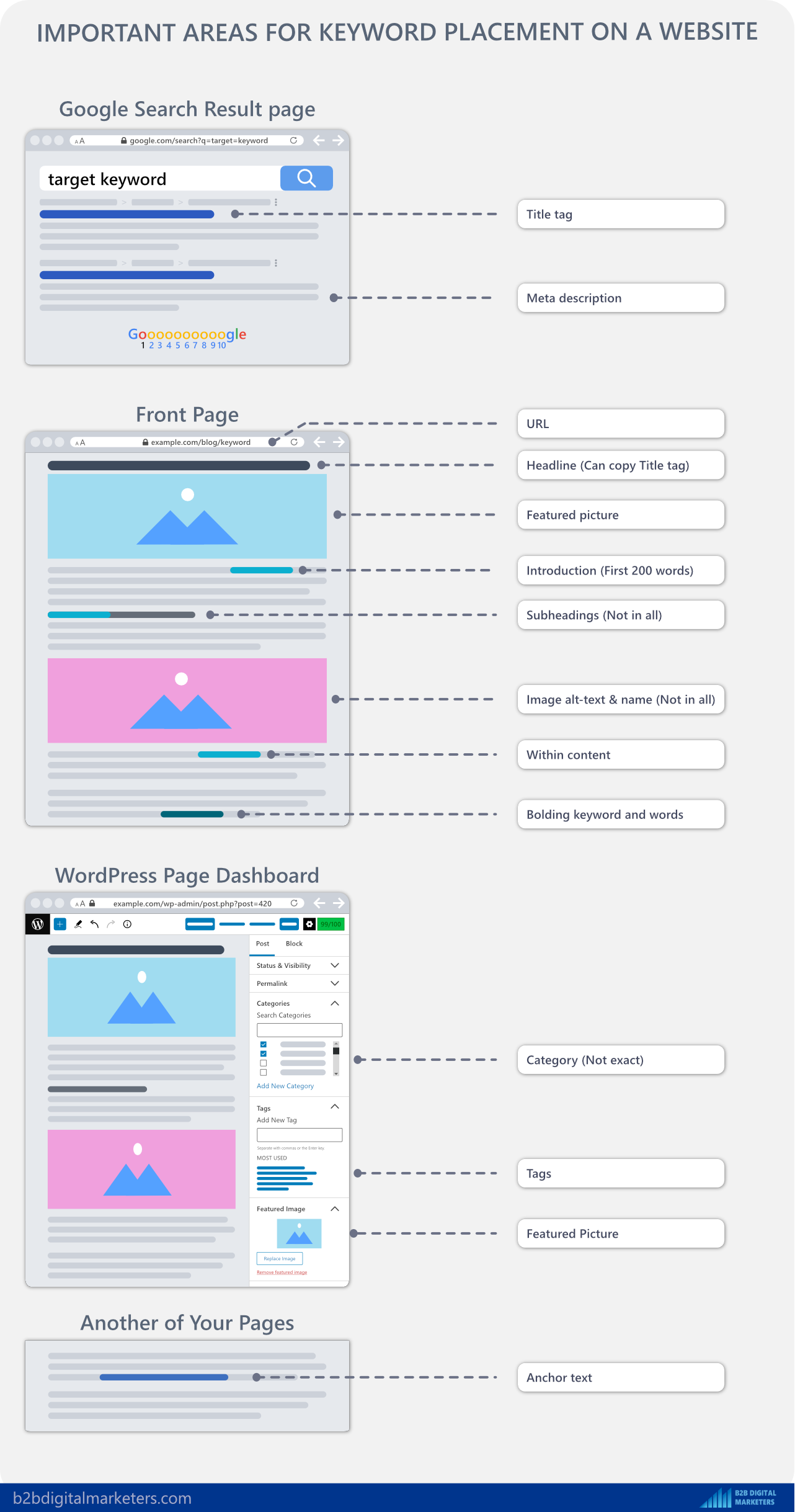
Practice #6: Check SERP Change in Case of Ranking Dropping
Another important practice when it comes to informational keywords is to regularly keep eye on SERP and keyword ranking changes.
Informational keywords can be volatile due to Google algorithm changes, increased competition, lack of backlinks, poor quality content, technical issue, or the search intent changed.
So, it’s important you regularly check your keyword ranking to ensure you can prevent or minimize any losses of rankings, organic traffic, and leads/sales for your business.
To do that, you should be using keyword rank tracking tools such as SE Ranking.
SE Ranking’s Keyword Rank Tracker is the most accurate tool in the market and a very useful tool for monitoring keyword rankings in major search engines such as Google, Bing, Yahoo, and YouTube. It allows you to track rankings in any language, location, and on any device, taking into account important variables that influence website rankings.
SE Ranking gives you a perfect summary of your keywords ranking allowing you to easily monitor any ranking changes and take quick actions.
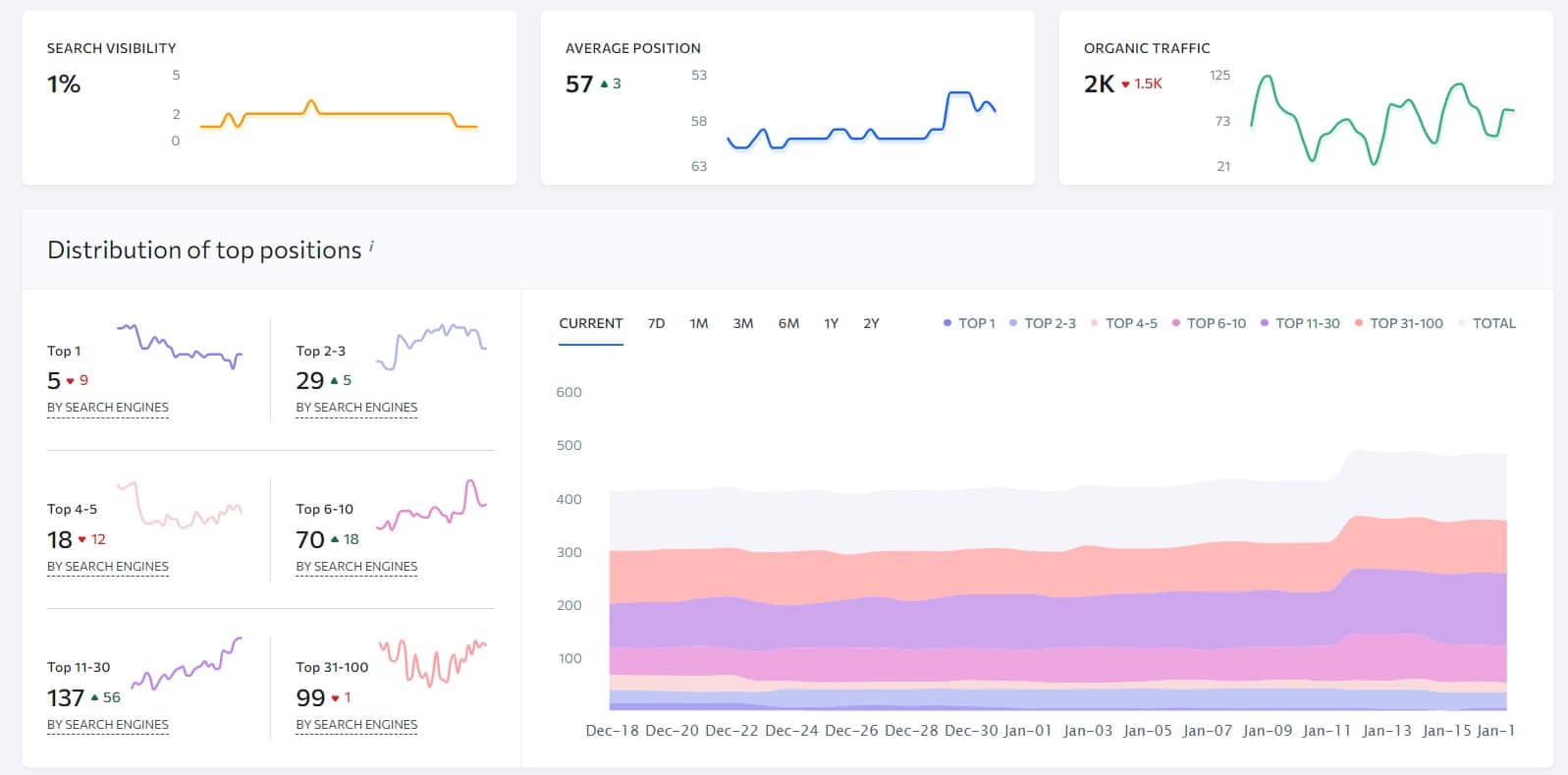
With keywords in SERPs that jumped, dropped, or are unchanged.
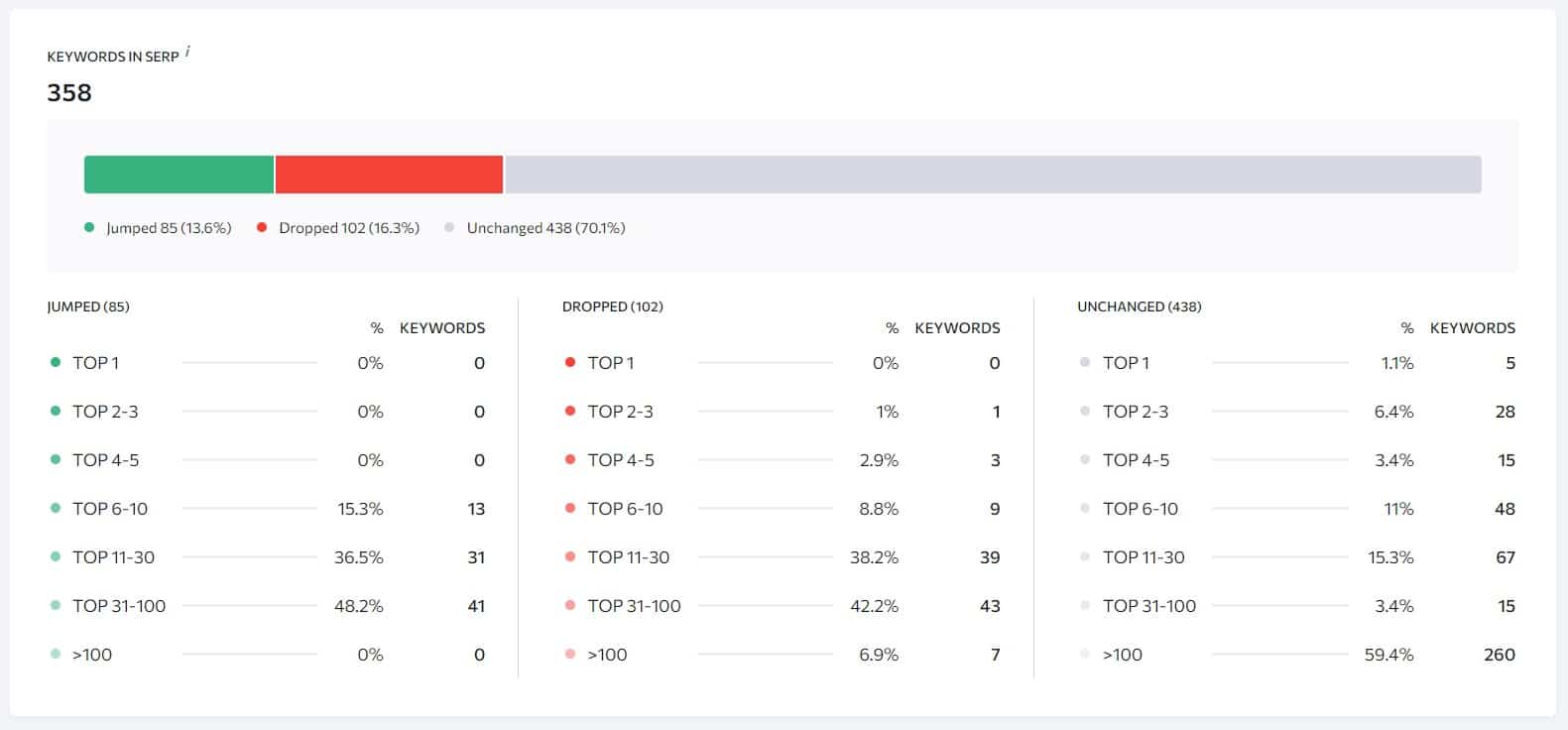
And also, overall ranking across your target locations and devices.
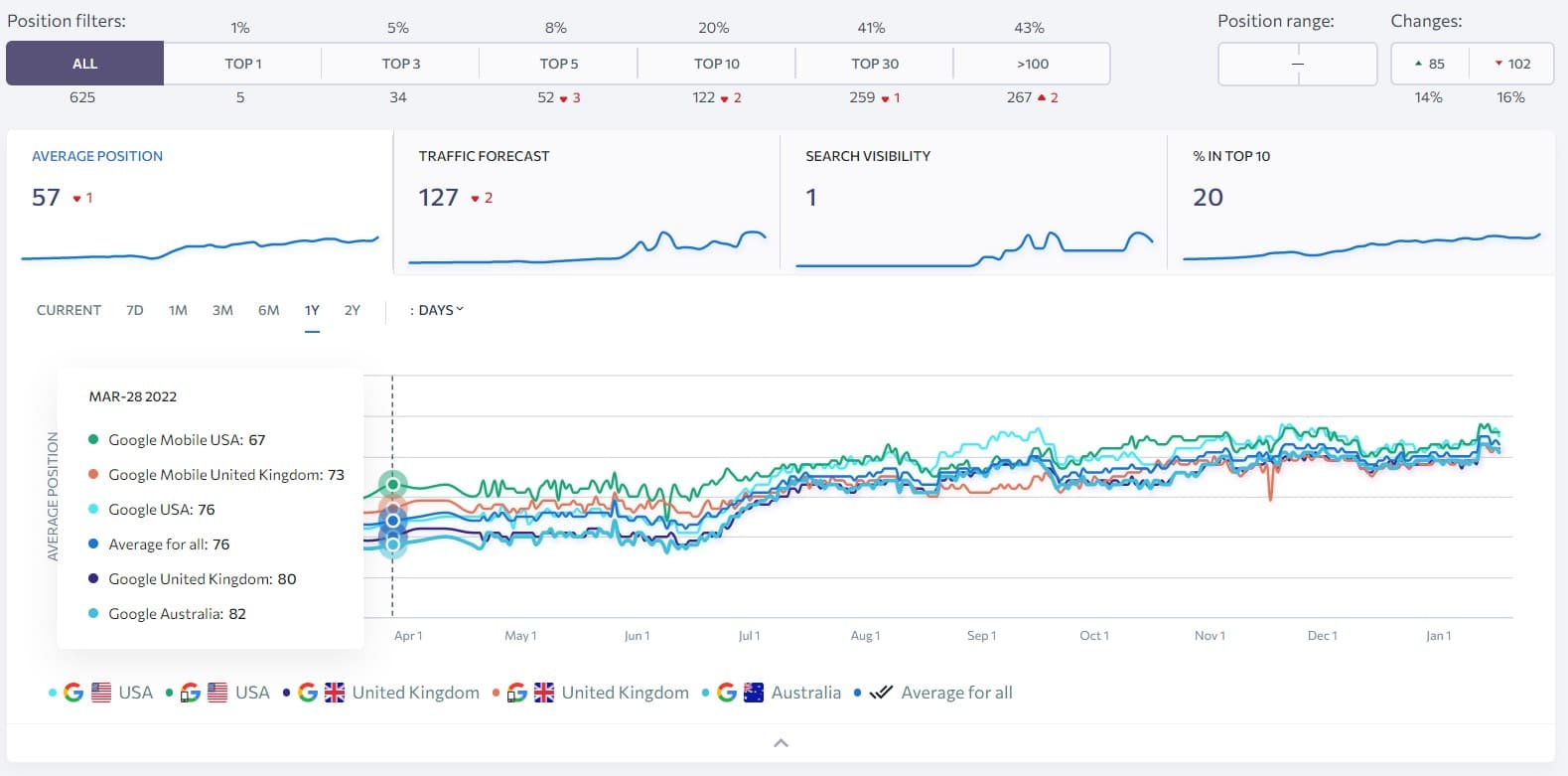
All this and more give you important information to easily track your keywords to prevent any ranking drops and loss of organic traffic.
When publishing new content, it’s crucial to add the primary keyword to your keyword rank tracking tool. For instance, after publishing a post on “b2b seo“, I immediately add it to my keyword rank tracker.
This way you can keep an eye on how your website is performing and make necessary adjustments to improve your search engine rankings.
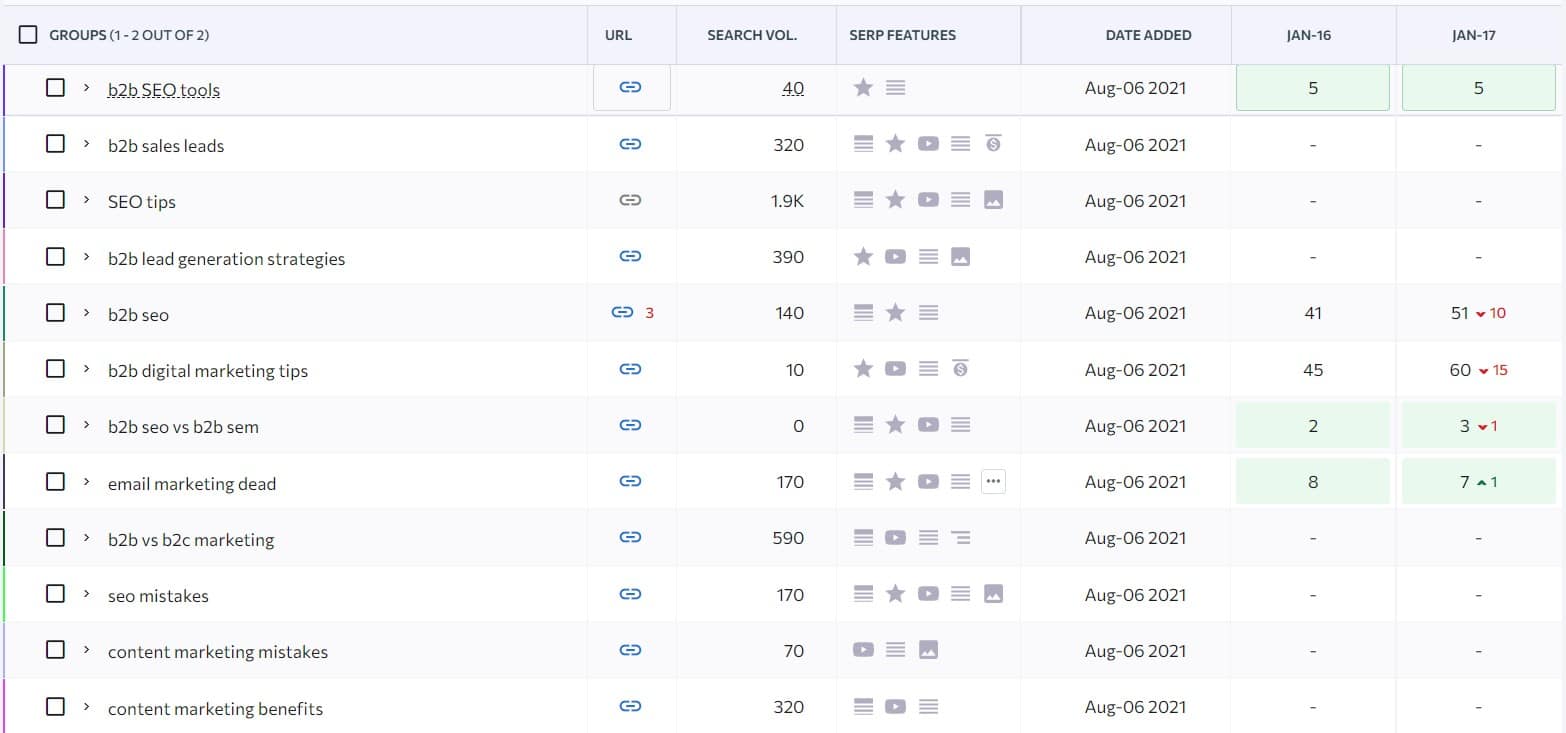
SEO tip: When you publish new content, make sure you add the primary keyword to your Keyword Rank Tracking tool right away. Pay attention to how long it takes for the page to start ranking for the keyword and what position it starts at. Ideally, your page should start ranking within a week at positions better than 20. If it takes longer and starts ranking at positions higher than 20, it could mean you’re targeting too competitive keywords and need to focus on easier-to-rank keywords instead. Learn more how to track keyword ranking.
To learn more, check out my article on SEO lead generation.
Practice #7: Add Relevant Gated Content to Informational Keywords
And the last best practice for informational keywords I have for you is to add relevant gated content to your informational keywords.
Remember, around 97% of users on your website never take any action.
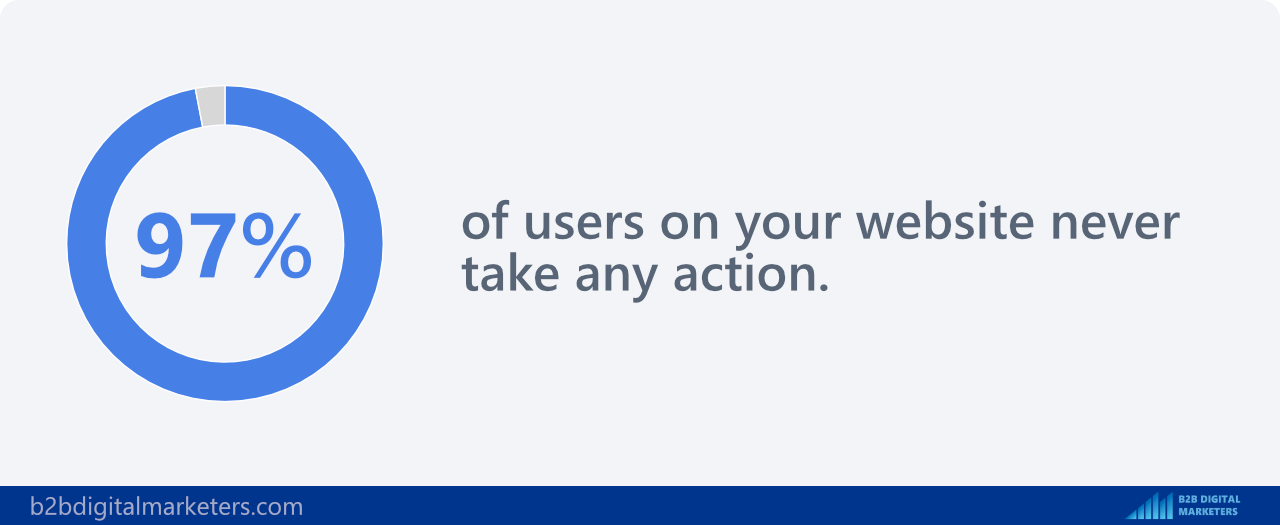
As said, informational keywords are not really great at generating SEO leads, but because they have a large search volume, can be easier to target and they are answering your target audience questions at the beginning of the buyer journey they are perfect for adding relevant gated content.
By providing gated content with more information on blog posts targeting informational keywords, you can capture your website visitors and create a lead nurturing sequence to stay in touch with them and guide them through the buyer journey. This can ultimately result in an increase in lead generation or sales.
However, I understand creating specific gated content for each blog post like HubSpot does is very challenging and you need to have large resources to do that.
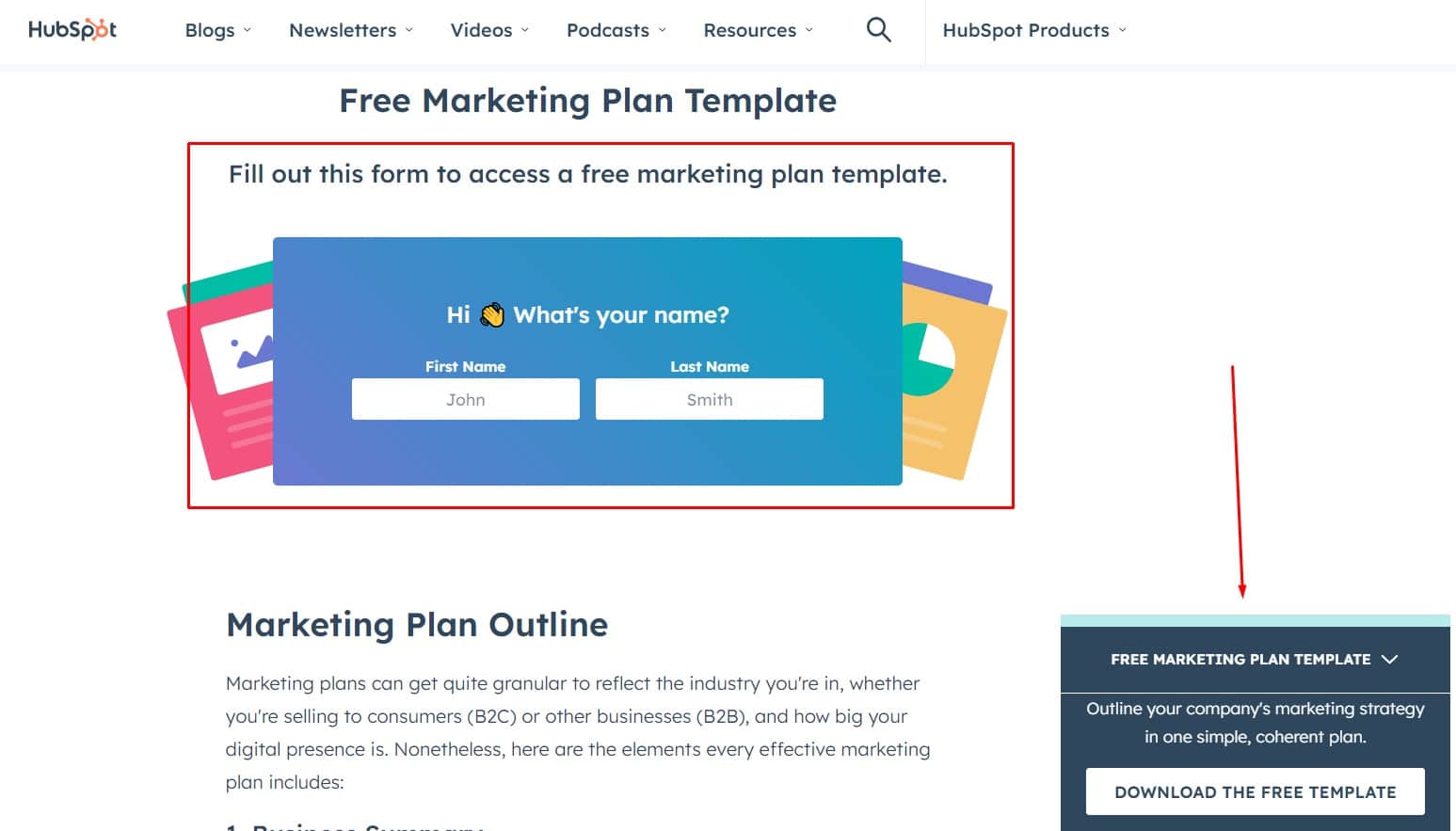
So, what I recommend is to create a category relevant gated content and lead magnets.
For example, my main category is SEO, so I can create a relevant SEO ebook and then promote it across all my SEO articles.
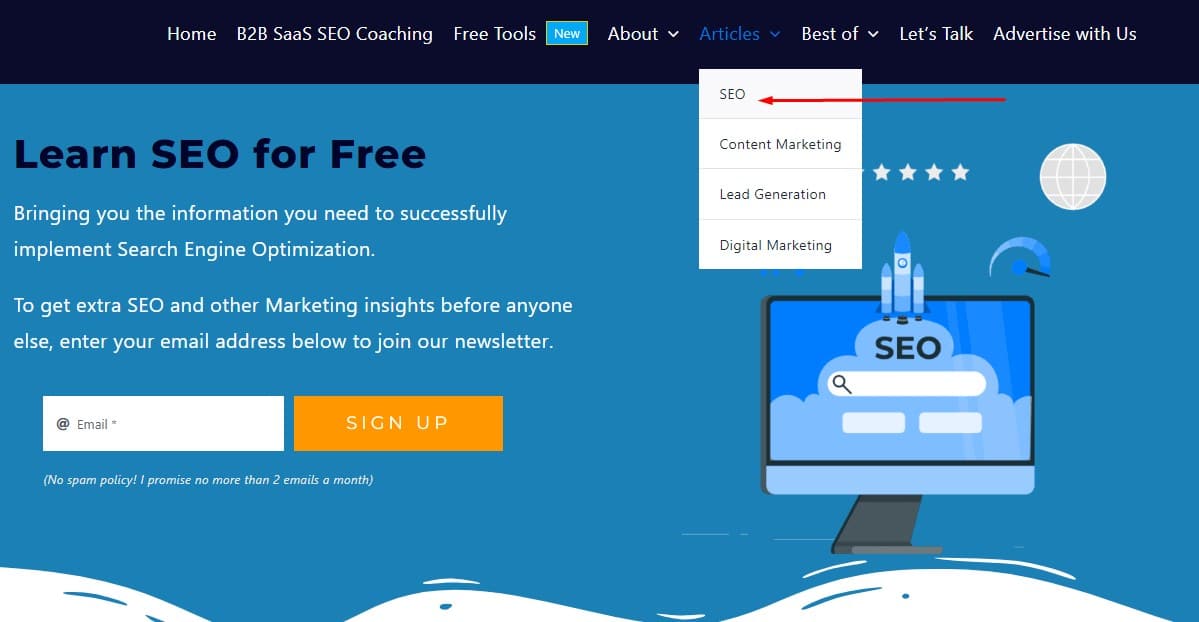
Or if I want to go a bit narrow, then I can create relevant lead magnets/gated content for my SEO subcategories such as link building, and create a lead magnet, such as an e-book or webinar, specifically about link building strategies and tactics.
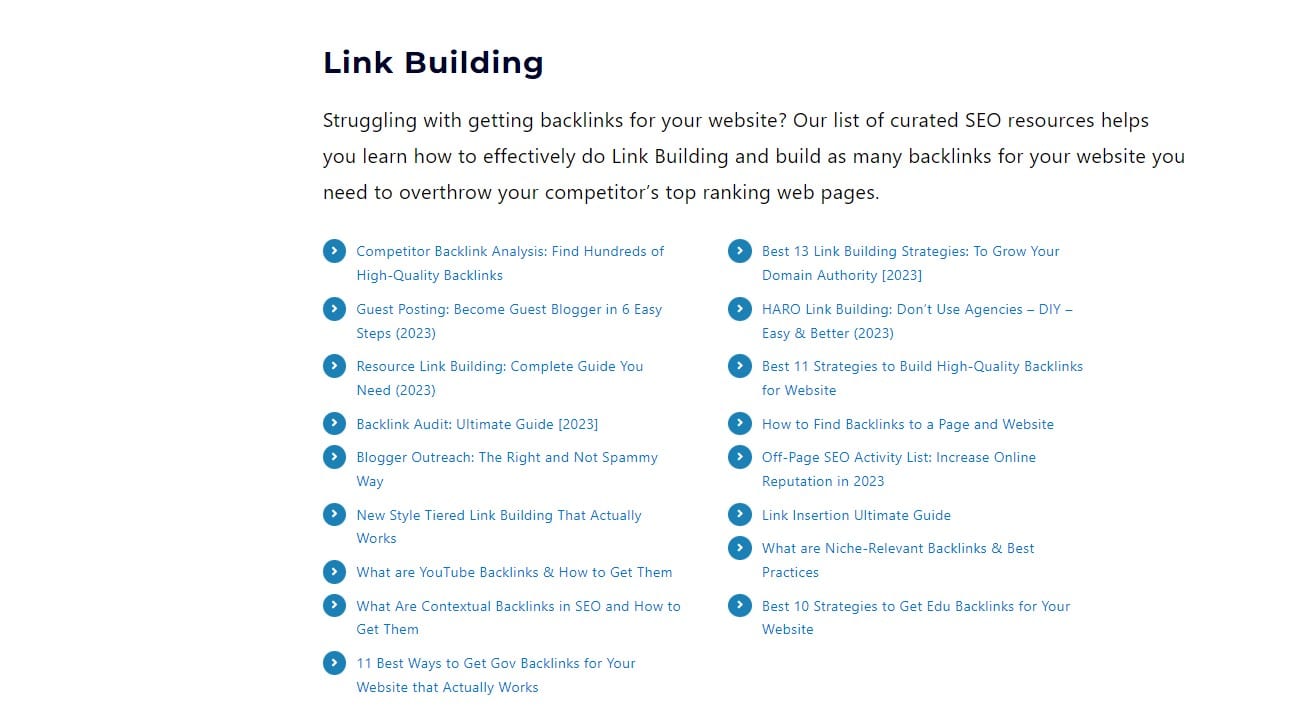
Or the best way is to create relevant gated content according to your topic clusters. For example, if your topic cluster is “electric cars” then you will create relevant gated content such as whitepapers, e-books, or webinars on topics like “The benefits of electric cars over traditional cars,” “How to choose the right electric car for your needs,” “The future of electric cars in the automobile industry” etc.
By providing valuable information in a gated format, you can capture leads and nurture them through the buyer journey while also positioning yourself as an authority in your field of expertise.
And you don’t even need to create new content for your eBook, but take your popular content and repurpose it into an eBook or whitepaper.
For example. I can take my SEO strategy article and repurpose it into an eBook and then promote it across all my SEO articles
Example of Informational Keywords List
Here are examples of informational keywords across different industries just to give you an idea:
| Electric Cars | Fitness | Photography | Gardening | Financial Planning |
|---|---|---|---|---|
| How do electric cars work | starting a workout routine | how to use canon camera | how to start a vegetable garden | how to create a budget |
| electric cars benefits | how to build workout routine | How to compose a photo | how to start gardening | what is financial planning |
| how long does it take to charge an electric car | best weight loss exercises | How to edit photos in Lightroom | how to prune a tomato plant | why is financial literacy important |
| how far can an electric car go | meal planning for weight loss | how to edit photos on iphone | best indoor plants for beginners | best way to start investing |
| cost to charge electric car | track fitness progress | how to take christmas light photos | best plants for beginner gardeners | why financial planning is important |
| how long do electric car batteries last | how to break a weight loss plateau | taking photos in low light | plants with disease | financial plan |
| longest range electric car | how to become a personal trainer | how to take professional photos | how to make compost | why are investments important |
Note: These are just examples of informational keywords that can be used in these industries. It’s important to do your own research on the keywords that are most relevant to your specific business and target audience.
Final Advice to Informational Keywords
Just focusing on commercial and transactional keywords is not enough to succeed in SEO and in marketing in general.
It’s important to target keywords across all stages of the buyer journey and have informational keywords to create brand awareness and visibility among your target audience.
In addition, informational keywords can help to establish your brand as a thought leader in your industry. By providing valuable information to your audience, you can build trust and credibility with them.
This is especially important when targeting long-tail keywords, as they are often used by people who are in the early stages of the buying journey and are looking for information to educate themselves on a topic.
Furthermore, it’s important to note that informational keywords can also be used to drive traffic to your website, even if they don’t result in direct conversions.
By creating high-quality content that answers the questions of your target audience, you can attract visitors who are interested in your brand and its offerings. This can help to increase your website’s visibility and engagement, ultimately resulting in more leads and sales in the long run.
In conclusion, targeting informational keywords is an important aspect of SEO and digital marketing, and should be part of a comprehensive approach to driving traffic, building brand awareness, and generating leads.
Related Articles:
- How to Find Keywords on a Website
- 13 Biggest Reasons Why is My Business Not Showing Up on Google?
- 7 Best Copy AI Alternatives (Free & Paid)
- Best 12 B2B Marketing Blogs to Up Your Skills
- B2B Blogging: Best Practices, Tips and Tricks
- Best 10 Screaming Frog Alternatives in 2023 [Free & Paid]
Also, check out our SEO hub page to find all our SEO resources.
Disclaimer
This article was created by Eduard Dziak and may contain affiliate links. The following were used to optimize the article for the best user and search engine experience include:
- SE Ranking for keyword research and on-page SEO optimization
- Surfer SEO for SEO-friendly content creation for users and search engines.
- Jasper AI for grammar correction and information enhancement.
The article is based on the author’s own experience and knowledge, drawn from both their own work and that of their clients, to provide the latest, proven methods.
Support the B2BDigitalMarketers
Hey, Eduard here.
As a solo blogger with limited resources, I need your support to keep creating in-depth SEO content like this. Please consider joining my Patreon community to help this site grow.
Your pledge – no matter how small – will enable me to dedicate more time to sharing actionable tips and strategies. With your help, I can take this project to the next level and really make a difference for other SEOs and marketers.
I would sincerely appreciate you joining me on this journey as a founding patron. Together, we can build an amazing resource hub. Hope to see you on the inside – thanks for your trust and support!








